#children in ancient Macedonia
Note
Hello professor !
I was wondering how children were raised in general in Macedon.. and if Alexandros had a daughter how would she be raised (educated? Would he treat her differently than most might since he was such a mammas boy?) Or what about if he survived to raise his son, I know the general stuff about his childhood but would the child be raised in pella or would he stay on the road with Alexandros?
Your answers are always very fun to read!! Thank you for taking the time to answer them!! :)
First, let me point to Mark Golden’s 2015 second edition of his original 1990 Children and Childhood in Classical Athens. It’s an important revision to a classic and includes new evidence, an updated discussion and bibliography. You can get it used for c. $20.
The obvious caveat applies, right there in the title: …in Classical Athens. This reflects a problem for studies of ancient Greek to which I’ve referred before: we’re prisoners of our evidence and the bulk of our evidence is Athenian. Ergo, too often, discussion of “ancient Greek culture” is really “ancient Athenian culture.”
Why does that matter? Greece was a patchwork of different-but-related linguistic and religious groups. Ionic-Attic populations (which includes Athens) were different from Doric (which includes Sparta), who were different again from Aeolic, and then you have oddballs like Macedon. And Epiros. And Thessaly. And Crete. And Cyprus (areas on the perimeter).
You get the idea.
So general assumptions would apply, but specifics might not, such as specific religious festivals or dedications to this or that god. Nonetheless, broad characteristics of childhood and the family seem to have been pretty universal in Magna Graecae. When did newborns become persons (not at conception or even at birth, but a few days after). What was family life like? When did boys separate from their mothers to be raised as little men? What sorts of toys were available? When did childhood end?
Given those broad brushstrokes we can say a few things.
Pregnancy, childbirth, and infancy were very much the purview of women. Male physicians were brought in only for a problem. At a child’s birth, the midwife presented the baby to the father to acknowledge; if he turned his back, that was the cue to expose it. Fathers didn’t have a great deal of hands-on experience with infants, who stayed in the nursery, but especially in normal households, they'd have been exposed to them regularly. (The scene between Hektor, Andromake, and Astyanax in the Iliad is heartbreaking, but demonstrates that even elite fathers interacted with their children.) The birth of a son, especially the first, was a cause for celebration. The birth of a daughter, less so; she might be more celebrated if a son (or two) were already on deck. That’s not to say fathers didn’t love their daughters. We’ve plenty of evidence to the contrary. But excitement at the birth of a girl depended on other factors.
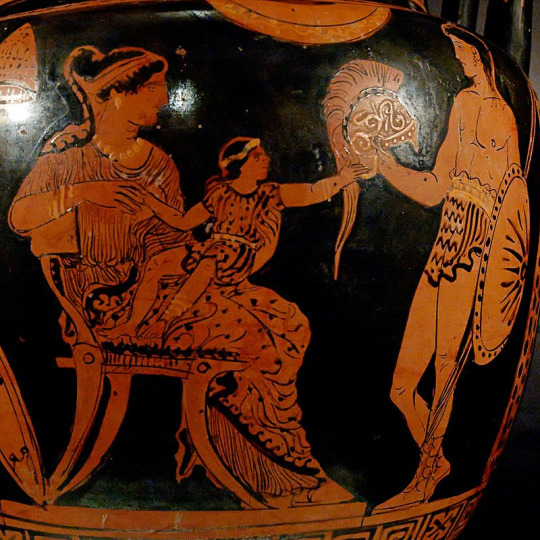
Infant mortality rates were relatively high, so there was a lot of “wait and see” following birth. Around day 7 or 10, the baby was brought into the family (i.e., became a person), and after the first year, more interest was taken in their future, including by the father.
Life for children (even elite children like Alexander) would have been a “whole family affair.” The Greeks had nuclear families but modified by several factors. The father’s elderly parents might live with them, especially when children were young. A widowed/unmarried sister (with no children) possibly also, but rarer. The family might also have a slave, possibly two. (Three+ tended to be a sign of wealth.) If two slaves, the second was probably a woman to help the mother with housework and childcare. Upper-class families would also have a nurse for young children, and a paidogogos (pedagogue, an elderly male slave who’d aged out of fieldwork), who kept an eye on boys outside the home (especially between 7-12/13). Children could become very fond of these non-relatives. Alexander reportedly loved his nurse, Lanikē, and his pedagogue, Lysimakos, although neither were slaves.

The notion that childcare is the mother’s primary or sole job is absurdly recent (and patently ridiculous). Even non-elite children would have had people in their lives besides parents and siblings; if the oikia (house) was occupied by Mama, Papa, and the kids, all around in the village or hamlet lived relatives. By-in-large, Greeks stayed where they were born, connected to land ownership and polis citizenship. Urban centers were a tad different, but not that much. Uncles and aunts lived nearby. “Distant” relatives were often sisters or nieces married to a man in a different town. Ergo, one grew up not only with siblings, but also cousins and other extended family. Given the rate of childhood death from disease, plus the dangers of warfare, most men wanted to have 2-3 boys, and 1-2 daughters. So 4-5 children was an ideal number. In a lot of fictional portrayals of Alexander, the fact he was 1 of 5 kids not that far apart in age (plus his cousin Amyntas), is often overlooked. He reads almost like an only child. He was anything but. (One reason I was keen to include his siblings in Dancing with the Lion.)
In any case, I think it important to keep in mind that children growing up had siblings, cousins, second- and third-cousins, maybe even the children of their slaves—all as playmates, babysitters, partners-in-crime, and sometimes antagonists. If gender divisions certainly existed, perhaps (in childhood) less than we might imagine.*

Until about the age of seven, all children remained with their mothers, living in the nursery and women’s rooms, although boys may have been taken out during the day to begin acquiring basic skills such as horsemanship, if the family were wealthy enough to own horses. And even young boys were encouraged to play with appropriately manly toys (miniature swords and armor, etc.)
In a boy’s seventh year, he left the women’s quarters to sleep with the men and, depending on his social status, to undergo basic education. If not elite, he’d have begun to work the farm with his father or learn his father’s craft. If he got any education (not free), it would have been what the family could afford and spare him for. Literacy among farmers, fisherman, and non-elite others was spotty, but the quantity of inscriptions by the 4th century argues for a rudimentary ability to read even among the lower classes (if not the abject poor).
After 12, non-elite boys would graduate to work with their fathers full time. In cities, they might have some free time for jobs on the side to get spending coin (fetch-and-carry, act as torch boys at night to lead home tipsy revelers: all the ancient version of lawn-mowing)—but this is pretty exclusively urban. In farming villages and hamlets, boys were working with Papa early. If they lived near enough to a large town with a gymnasion, they might engage in sports in late afternoon. A non-elite boy who showed promise in a sport might (like today) find a sponsor and be trained for a career in it on the Circuit (the Games).
Elite boys had a different path. They also left the nursery at 7 but were then carefully groomed to take their place as city leaders as well as to run their estates. They’d travel their properties with their fathers to learn the business, attend school, and the gymnasion to train physically. Once that initial schooling ended c. 12, they might attend lectures by sophists for some years, if in a sizable enough city—or be sent to one for such an education. This was less formal, the goal to train elite boys in rhetoric (giving speeches) and eristics (the art of argument), for a career in politics. (Sparta had their own system, but the training of elite Spartans bore commonalities with that of other elite boys around Greece.)
Girls never left the women’s rooms but began to learn skills quite young. That doesn’t mean they never played, or had pets, or had fun. Like boys, their education in wifely skills intensified after 10/11/12. Elite women almost certainly learned some letters, but it’s dubious how much farmer-class girls acquired. Reading wasn’t a necessary skill. Arithmatic was, to keep track of the larder, for counting in weaving patterns, etc. But they’d have been taught this by their mothers. Girls had no formal education (Sparta being something of an exception).
After a girl’s first menses, she occupied liminal space, considered “dangerous”: wild and emotional, so it was important to marry her off as soon as seemly and get her pregnant to anchor her wombs and thus ground her. First menses in antiquity occurred c. 13-14. She might then be betrothed at 14-15, and married at 15-16. Elite girls could be promised even earlier as those marriages were political and for business, but she wasn’t usually married until after her first menarch.
Ergo, except for elite boys (who might experience an “adolescent moratorium”), for most Greeks, “childhood” ended c. 12/13/14.
This basic pattern would not have been hugely different in Macedonia, certainly by Philip’s day when education was more readily available, especially in the few, large lowland cities such as Pella. Rural and highland areas probably didn’t have much education and a child’s development would mirror that of the rural poor in the rest of Greece: start working with Papa in the fields or with Mama in the women’s rooms quite young. Yet Philip ushered in long-term campaigning. Ergo, for Macedonian children, Papa might be gone for months on end. But uncle, or grandpa, might not be. Neither Philip nor Alexander ever took all men of fighting age out of Macedonia; it was neither practical nor safe. Plenty of family members remained to help raise children. Father would return home periodically, probably with loot. Their fathers may not have been terribly significant figures in these children’s lives, except (maybe) as a “hero” to aspire to be like.
Once Alexander took men to Asia, the chance to see one’s father even occasionally evaporated. About a year-and-a-half in, Alexander did send newlyweds home for some months to “make babies,” but once he left the coast to turn inland, that stopped. This translated into a population drop, back in Macedonia. If perhaps not as bad as Brian Bosworth presumed, it remained noticeable. Both Philip and Alexander realized that taking men out of Macedonia for years had a detrimental effect, but their ambition led them to do it anyway.
Most of Alexander’s men on campaign actually formed unions with local women along the road. In 324, in Susa, he had these unions recognized, at least for men not already married. Slightly later, when he discharged the older men to return home, he kept their half-Asian children (and mistresses) in Asia, promising to raise them in Macedonian fashion, feed, clothe, and train them. The reason given was to avoid causing problems in their families back home (with prior wives and legitimate children). If this was useful to Alexander, providing him with a large number of ethnically mixed recruits, dependent on him, to build future armies, it was also compassionate. Such children in most armies were ignored, their mothers dumped when the men went home. Alexander had money to burn, but this wasn’t a small undertaking. (Zeus alone knows what happened to those children after he died; his Successors weren’t either interested or obligated.)
Anyway, Alexander’s treatment of own children, if he’d lived long enough to concern himself with them, would not have been radically different from his father’s approach with him. In fact, he’d probably have seen them even less, especially in their early years, given his penchant to campaign far afield. He’d assume the babies would be raised in Susa or Babylon. I expect Alexander would have wanted them to learn not only Macedonian and Greek ways, but also Persian. Girls would probably have been taught according to the Persian traditions of their mothers, although he might have insisted they learn to weave (not a skill upper-class Persian women pursued, but important to Greek women of all classes).
Boys, I expect, he’d assume to follow a similar experience as his own: with their mothers for the first 7 years, then given a basic education, including physical, just as he’d been, all in the palaces/capitals. I doubt he’d have had any more inclination to take them on the road than Philip had with him.
Around the age of 12/13/14, then he might have had sons brought to join him on campaign, where they’d serve in the Pages, or have other, age-appropriate assignments to give them proper military exposure, including early officer assignments, etc.
So while I don’t think Alexander would have been a bad father—probably rather doting—he almost certainly would have been a distant father, at least for his children’s early years, largely due to his own ambition. Maybe he’d have slowed down as he approached forty, but Philip didn’t. I don’t think he was capable of staying put for long unless you nailed his feet to the floor. So, I doubt his kids would have seen much of him until they were approaching teen years, and then largely the boys.
———————————
*My father was the eldest of 13 children, most of whom had 2+ in turn themselves. I grew up at a distance from most, but summers brought family reunions over weeks where literally dozens of us would run wild on some aunt or uncle’s farm, or at Grandpa’s house, fishing from the pier on Carbon Lake. It’s a wonder none of us drowned or were otherwise seriously hurt, but the older cousins always had a watchful eye on the younger. We had very little contact during the day with our parents, dashing in to eat when called, but it was mostly infants and toddlers who spent time with mothers, and these were passed around. The oldest female cousins also wandered about with a toddler in arms, especially when it was time for our mothers to make dinner or they had other duties requiring free hands. For the toddlers, to “get out with the big kids” was incentive to leave the kitchen as soon as their mothers permitted it.
#asks#Alexander the Great#Children in ancient Greece#childhood in ancient Greece#children in ancient Macedonia#ancient childhood#Alexander the Great's children#Classics#ancient Greek history#ancient Greek social history#tagamemnon
33 notes
·
View notes
Note
Please do spill some of your Mama Greece hcs sometime if you feel comfortable because I love your thoughts on her
You have unleashed a beast Grammy. Here's a brief life history of my Mama Greece. (I can say so much more)
Human Name: Helene (also Lavinia, we'll get to it)
Her father was Mycenae (Mycenaean Greece). She looked up to him greatly as a child.
I headcanon that the City-States of Greece were also personified, and that Helene represented the Greek World as a whole, the one that followed after Mycenae Greece. The City-States aren't really related to her, I kind of characterize them as a cousins.
The City-States don't have much personality that I've decided, but Sparta was a women and a badass, and Athens was a philosophizing misogynist.
For a long time, because Helene represented the Greek World as a whole and the City-States were in charge of themselves she mostly got to spend her time doing whatever the hell she wanted. Disguising herself as a man often, and becoming a genius in mathematics and philosophy. She wasn't so much bothered with war and work for a long time, though she was was a skilled sword woman. She spent much of her time in this period in a hedonistic lifestyle (and I like to think she was involved with the Cult of Dionysus)
And then there was Persia. Their relationship was one you could call enemies with benefits. Vitriolic, Helene didn't much like him, but he was a good fuck. Their relationship got worse overtime, though there was a mutual respect between the two. Basically the France and England of the Ancient times.
When Macedonia began to conquer Greece, I characterize this as him killing off the City-States. Now obviously these places lived on, but it was still a turning point in Greek history, and I think eventually Macedonia would go after Helene - to become the "true" Greek World - and Helene would kill him in turn.
This is when Helene takes on a lot more responsibility. She becomes more a warrior and get into politics. This is also around the time where she and Persia have their final match and she kills him.
Greece is born around this time. Either he pops out of the ground and she finds him, or she actually gives birth to him. I headcanon he comes out of the ground. Either way, he is her and Persia's son and is born during the Hellenistic Period. (What will eventually become Iran is also born of this union and Idk if Helene had any contact with her at this time)
Gonna skip forward a bit to her relationship with Rome. Rome is a complex relationship. They did deeply love each other, Rome more so. He would call her the Venus to his Mars. That said, he still cheated on her frequently, and she could never truly forgive him for taking over her. Still, they were married. They were a devoted, loving couple. She was a vital part of him and his muse in many respects. And she helped raise his children. Romano was her son with Rome, and she was one of Veneziano's mothers (Vene has two mothers, her and Gaul, and Rome is obviously his father.)
(Rome tried to bring Gaul back home once and Helene shut that shit down quickly.)
She lived off and on between her house in her homelands and Rome's villa. I don't know where Greece was at the time, although a part of me wants to say Greece was not allowed to be raised in Rome's home with his sons. So possibly Greece spent most of his time when he and his Mama would visit Rome living with the servants and Helene would be sure to visit him throughout the day and make sure he was doing alright. When they would return to her home she would make sure she could be as openly affectionate with him as possible.
The "Divorce" happens when she becomes the Eastern Roman Empire, which Rome wasn't exactly a fan of. She moved to Constantinople with Greece, though she and Rome may have sometimes had secret trysts.
I have this imagine in my head that when he died she found his body and slipped his bloody helmet off of his head and placed it on her own. She renamed herself the Byzantine Empire and took on a new human name, Lavinia. The ancient of wife of Aeneas.
Also, as Byzantine she marries Kievan Rus (Olga) or at least they become a couple for a while, which makes her technically Ukraine, Russia, and Belarus's other mother. There was some love there, but their relationship was strained. She was not much of a mother to Rus's kids as well, though Ukraine has memories of Mama Byzantine and how powerful and glorious she was.
As for Romano and Veneziano, both were territories for her at a time, but I think she would have left them in their respective territories to be educated/raised by their people in charge. They are just a reminder of their father and what he did to her, though she does miss them and sometimes visit them. I think losing Romano would've been harder on her than losing Veneziano. Romano was always her favorite of the two, plus the loss of Southern Italy was different than the loss of Venice. She willingly gave Veneziano indepdence. Romano she held onto for a long time but eventually lost.
...Plus little Veneziano would eventually take the attitude of "Fuck You This Is Mine Now" and played a part in her weakening when he not only funded a trip to reinstate a deposed Byzantine prince but then looted and pillaged Constantinople when he didn't get his money back and took some more of her lands. Bad Veneziano. Sit in your corner and think about what you've done (I genuinely don't know how this works with his canon personality but this did all happen irl) (also yes I see Veneziano as Venice because I find that to make the most sense and be coolest for his character)
And then we fast forward to her eventual death at the hands of Turkey. Do I think he loved her? ...I think he was in awe of her. I think he loved the idea of her. I think he looked at her history and I think he wished that he could be like her or wished that he could be with her. But also, he did kill her. In my imagery laden mind he finds her under an olive tree and killed her there. Maybe there was a fight. Maybe she finally accepted it.
tl;dr: Helene starts as the heir to a power vacuum after the death of her father, but instead of taking charge and responsibility she spends her time doing as she pleases and learning while the city-states handle things. Until Macedonia roles up and she kills him before he can kill her and she takes charge, she kills her rival and sometimes lover Persia and he gives her her greatest treasure Herakles, her son. And also has a daughter that she doesn't interact with much. She marries Rome to survive and forms a loving, if dysfunctional marriage and has another son Romano, and there's also Veneziano who is her son with Rome but also Gaul. When Rome is killed she takes her place as the Byzantine empire and spends years just trying to survive and adapt and persevere until finally she accepts her death at the hands of Turkey.
For personality headcanons: I characterize her being motivated by a fear of death to collect as many skills as possible and adapt to her surroundings. The Greeks HATED talking about death and I think that would bleed over into her actual beliefs. I think she rarely, if ever, let herself die, because she was always afraid that she would die for the final time.
By the end of her life she is a full on genius. Math, language, astronomy, art, philosophy, even music and theatre. She had this insatiable curiosity and need to learn that sometimes overtook her best instincts of survival.
Physical Headcanons: 6'0'' because I can. Her body fluctuates between incredibly muscular, on the thicker side, and thin from weakness over her many years of life. For some basic ages: By the the she kills Persia she is physically in her early twenties. Late twenties when she marries Rome. Early thirties when she takes over as Byzanties. Early-Mid forties at her death (Turkey is into Milfs).
This is what I think she would have looked like probably around the time she married Rome. It is missing a few details. She's not as tanned as I imagine her, she doesn't have the moles I imagine her having, and I couldn't get her nose right-I imagine she has a hooked nose.

#did you not ask for a brief (IN WHAT WORLD IS THIS BRIEF?) history of mama greece's entire lifestory?#historical hetalia#hetalia#hws#hws mama greece#aph mama greece#hws ancient greece#aph ancient greece#hws romano#aph romano#hws greece#aph greece#hws ancient rome#aph ancient rome#i have so many thoughts on veneziano and romano's childhood#and i'm SO MAD that 1100 years after rome's death IN CANON they are STILL CHIBIS#ask me about my beloved misunderstood genius romano with adhd and autism#technically i headcanon mama greece's name to be helen but helene works just the same#her entire history and personality is defined by a desire to survive and keep going#turkey being into milfs is my favorite thing ever#oh god I hope this post goes over well
55 notes
·
View notes
Text
... Ancient sources tell us nothing directly about the personality, character, world view or even the appearance of the daughter of Neoptolemus (Olympias) as her wedding entourage set off over the Pindus Mountains in the direction of her new kingdom. However, based on what is known about her life and background, we can speculate about her views and circumstance as she began her public career.
Though only in her mid- to late teens, this young woman had already experienced a great deal. While still a young child, she had seen her father lose sole control of his kingdom. A possibly tense period of uncertain duration followed in which he and his brother shared rule. Then her father Neoptolemus died, leaving his children in what may well have seemed the sinister guardianship of their uncle. Probably soon after that, her uncle married her sister. Shortly before Olympias’ betrothal, the Illyrians invaded her country. Frontinus (2.5.19) reports that Arybbas sent the non-combatants as refugees into Aetolia, while he and whatever army he could gather withdrew to the mountains in order to utilize guerrilla tactics against the much larger invading force. Presumably Olympias and her sister would have endured the danger of the invasion and the uncertainty of evacuation. More recently yet, Olympias had made the long journey to Samothrace. Even before her entry into Macedonia, Olympias had dealt with political intrigue, physical danger, and the loss of her most powerful protector, and had traveled to two different foreign territories. Her life began, much as it would end, in uncertainty and danger.
Despite her early entry into the world of power politics and violence, as my comparison and contrast of the two kingdoms should have implied, the society Olympias would encounter in Macedonia, though likely much less alien to her than that of Thebes or Athens, would have been different from her previous experience. Philip’s court was certainly richer and more cosmopolitan than that of Arybbas, or at least it became so soon after her arrival. Military activity and success mattered more in the Macedonian court. The climate and terrain around Pella and Aegae, the Macedonian capitals, was much milder than that of Olympias’ homeland. Philip had more power over the Macedonians than her uncle did over the Molossians. As we shall see, Philip already had several wives and children (and may have had concubines in residence, as well). Despite the fact that Olympias had grown up in a court that was itself not without intrigue, the level of complexity that she would encounter in the court of Philip would be far greater than that of Arybbas (although Olympias would surely have been warned to expect the presence of the other wives).
It is particularly difficult to assess Olympias’ probable attitude toward her coming marriage. Literature written by Greek women stresses the pain and loss of identity the break between the world (family and friends) of a young unmarried girl and a bride occasioned. Olympias’ distance from the land of her birth could have exacerbated this feeling. However, since her father was dead, her mother may have been, and we do not know how well she got on with her uncle and how comfortable she was at his court, we cannot tell whether she would have been glad to leave.
What we do know is that she brought her pride in her lineage with her. Hers was a more prestigious marriage than that of any previous Aeacid woman and, if her wedding were indeed held at a major Macedonian festival, her nuptials were more elaborate and public than those of previous Molossian royal women. Olympias’ Aeacid descent would continue to be a support and source of identity to herself and both her children.
In her subsequent career, Olympias consistently pursued her son’s and then her grandson’s political interests, tending to regard any check on their power, the prominence of any other figure, as a threat to them. Herself the product of a relatively weak monarchic system, she regularly attempted to create a situation which enabled both her male kin and herself to act more absolutely. This response was probably instinctive, certainly not at first a conscious plan or policy, though it would become one. Olympias was, like Philip, a person with a knack for seeing the possibilities for exploitation in a situation. Even early on in her Macedonian career, she demonstrated that. If Olympias the young girl was anything like Olympias the mature woman, then she would have been aware of many of the dangers and complications awaiting her, but she would not have been fearful and she would not have been timid.
- Elizabeth Carney, “Olympias: Mother of Alexander the Great” /
13 notes
·
View notes
Text
Holidays 3.12
Holidays
Alfred Hitchcock Day
Amalthoea Asteroid Day
Arbor Day (China, Taiwan)
Ashley Johnson-Barr Day
Coca Cola Bottle Day
Day of the Seven Billion
Detransition Awareness Day
Employee Day
Fireside Chat Day
Flag Day (Saudi Arabia; Sweden)
Girl Scout's Day
Grækarismessa (Traditionally, the Oystercatcher, the Faroe Islands' national bird returns this day)
Gregoru Diena (Ancient Latvian Groundhog Day)
Hound Matsuri Komaki (Celebration of the Penis; Japan)
International Day of Tweeters
International Yes Day
IUGR (Intrauterine Growth Restriction) Awareness Day
Mammal Big Day
Martyrdom of Hypatia of Alexandria
Mourning for Grand Chief Sir Michael Somare Day (Papua New Guinea)
National Alfred Hitchcock Day
National Arts Advocacy Day
National Christian Day
National Map Day
National Ruth Day
National Shield Day (Argentina)
National Working Moms Day
Parsley Day (French Republic)
Plant a Flower Day
Sun-Earth Day
30 MPH Speed Limit Introduction Day (UK; 1935)
312 Day
Tree Day (Republic of Macedonia)
Truman Doctrine Day
Wallet Day (Japan)
Workers of the Penal System of the Ministry of Justice (Russia)
World Agnihotra Day
World Day Against Cyber Censorship (UN)
World Glaucoma Day
Youth Day (Zambia)
Z Day
Food & Drink Celebrations
Eskimo Pie Day
National Baked Scallops Day
National Milky Way Day
2nd Tuesday in March
Gambling Disorder Screening Day [2nd Tuesday]
Organize Your Home Office Day [2nd Tuesday]
Independence & Related Days
Basutoland Annexation Day (by UK; 1868)
Renovation Day (Founding of Democratic Party; Gabon; 1968)
Mauritius (from UK, 1968)
Woodlandia (Declared; 2019) [unrecognized]
New Year’s Days
Aztec New Year
Festivals Beginning March 12, 2024
AgriTek/FarmTek Astana (Astana, Kazakhstan) [thru 3.14]
Eastern Winery Expo (Syracuse, New York) [thru 3.14]
Expo West (Anaheim, California) [thru 3.16]
London Book Fair (London, England) [thru 3.14]
Feast Days
Alphege of Winchester (Christian; Saint)
Aristippus (Positivist; Saint)
Aztec New Year (Starza Pagan Book of Days)
Bernard of Carinola (or of Capua; Christian; Saint)
Blot to Odhinn All-Father (Pagan)
Charles Balthazar Julien Févret de Saint-Mémin (Artology)
Cuddle an Accountant Day (Pastafarian)
Cuddle a Policeman Day (Pastafarian)
Edward Albee (Writerism)
Elaine Fried de Kooning (Artology)
End of the World by Sekhmet (Egyptian Warrior Goddess)
Feast of Marduk (Babylonia; Mesopotamian)
Fiesta de las Fallas begins (Spain)
Fina (Christian; Saint)
The Genie (Muppetism)
Gorgonius, Peter Cubicularius and Dorotheus of Nicomedia (Christian; Martyrs)
Gregor the Great (Christian; Saint)
Houdini Day (Church of the SubGenius; Saint)
Huddling for Fairies of the Third Flight (Shamanism)
Jack Kerouac (Writerism)
Maha Shivaratri (Festival of Shiva; Hindu)
Maximilian of Tebessa (a.k.a. of Numidia; Christian; Martyr)
Mura (a.k.a. McFeredach; Christian; Saint)
Parchment Protection Day (Celtic Book of Days)
Paul Aurelian (a.k.a. Paul of Cornwall; Christian; Saint)
Pope Gregory I (Eastern Orthodox Church, Eastern Catholic Church, and Anglican Communion)
Seraphina (a.k.a. Fina; Christian; Saint)
Theophanes the Confessor (or Chronicler; Christian; Saint)
Wenchang Wang Day (God of Literature; China)
Lucky & Unlucky Days
Butsumetsu (仏滅 Japan) [Unlucky all day.]
Prime Number Day: 71 [20 of 72]
Unfortunate Day (Pagan) [19 of 57]
Premieres
Bad Hair Day, by Weird Al Yankovic (Album; 1996)
A Bell for Adano, by John Hersey (Novel; 1944)
Bend It Like Beckham (Film; 2003)
The Book of Three, by Lloyd Alexander [Chronicles of Prydain #1]
The Cat in the Hat, by Dr. Seuss (Children’s Book; 1955)
Clippety Clobbered (WB LT Cartoon; 1966)
Couples, by John Updike (Novel; 1968)
East of Eden, by John Steinbeck (Novel; 1953)
Fanfare for the Common Man, by Aaron Copland (Fanfare; 1943)
The Flying Jalopy (Disney Cartoon; 1943)
Glass Houses, by Billy Joel (Album; 1980)
Go, Dog. Go!, by P.D. Eastman (Children’s Book; 1961)
Hachi: A Dog’s Tale (Film; 2010)
It’s Like That, by Run-DMC (Song; 1983)
King’s Up (Oswald the Lucky Rabbit Cartoon; 1934)
La Sylphide, by Jean-Madeleine Schneitzhoeffer and Adolphe Nourrit (Ballet; 1832)
Lighthouse Mouse (WB MM Cartoon; 1955)
Light in August, by William Faulkner (Novel; 1932)
The Little Bantamweight (Happy Harmonies MGM Cartoon; 1938)
Live at the Sunset Strip, by Richard Pryor (Stand-Up Comedy Show; 1982)
Longitude, by Dava Sobel (Book; 1996)
Nancy Steele is Missing (Film; 1937)
Nothing Like It In the World, by Stephen E. Ambrose (Book; 2001)
One Fish, Two Fish, Red Fish, Blue Fish, by Dr. Seuss (Children’s Book; 1960)
Out of Time, by R.E.M. (Album; 1991)
Resident Evil (Film; 2002)
Rosemary's Baby, by Ira Levin (Novel; 1967)
Seven Thieves (Film; 1960)
She’s Out of My League (Film; 2010)
The Shield (TV Series; 2002)
The Sneezing Weasels (WB MM Cartoon; 1938)
Southbound Duckling (Tom & Jerry Cartoon; 1955)
Ten Apples Up On Top!, by Dr. Seuss (Children’s Book; 1961)
22, by Taylor Swift (Song; 2013)
The Velvet Underground and Nico, by The Velvet Underground (Album; 1967)
Where Eagles Dare (Film; 1969)
Wonderfalls (TV Series; 2004)
Today’s Name Days
Almut, Beatrix, Serafina (Austria)
Bernard, Budislav, Fina (Croatia)
Řehoř (Czech Republic)
Gregorius (Denmark)
Rego, Reio (Estonia)
Reijo, Reko (Finland)
Justine, Pol (France)
Almut, Beatrix, Serafina (Germany)
Theofania, Theofanis (Greece)
Gergely (Hungary)
Massimiliano, Simplicio, Zeno, Zenona (Italy)
Aija, Aiva, Aivis, Ausmins, Gregors (Latvia)
Darmantė, Galvirdas, Grigalius (Lithuania)
Gregor, Gro (Norway)
Bernard, Blizbor, Grzegorz, Józefina, Wasyl (Poland)
Simeon, Teofan (Romania)
Kira, Marina (Russia)
Gregor (Slovakia)
Inocencio (Spain)
Victoria, Viktoria (Sweden)
Maryna (Ukrainę)
Graig, Grayson, Greg, Gregoria, Gregorio, Gregory, Orion (USA)
Today is Also…
Day of Year: Day 72 of 2024; 294 days remaining in the year
ISO: Day 2 of week 11 of 2024
Celtic Tree Calendar: Nuin (Ash) [Day 24 of 28]
Chinese: Month 2 (Ding-Mao), Day 3 (Yi-Hai)
Chinese Year of the: Dragon 4722 (until January 29, 2025)
Hebrew: 2 Adair II 5784
Islamic: 2 Ramadan 1445
J Cal: 12 Green; Fryday [12 of 30]
Julian: 28 February 2024
Moon: 7%: Waxing Crescent
Positivist: 16 Aristotle (3rd Month) [Antisthenes]
Runic Half Month: Beore (Birch Tree) [Day 3 of 15]
Season: Winter (Day 83 of 89)
Week: 2nd Week of March
Zodiac: Pisces (Day 23 of 30)
0 notes
Text
Holidays 3.12
Holidays
Alfred Hitchcock Day
Amalthoea Asteroid Day
Arbor Day (China, Taiwan)
Ashley Johnson-Barr Day
Coca Cola Bottle Day
Day of the Seven Billion
Detransition Awareness Day
Employee Day
Fireside Chat Day
Flag Day (Saudi Arabia; Sweden)
Girl Scout's Day
Grækarismessa (Traditionally, the Oystercatcher, the Faroe Islands' national bird returns this day)
Gregoru Diena (Ancient Latvian Groundhog Day)
Hound Matsuri Komaki (Celebration of the Penis; Japan)
International Day of Tweeters
International Yes Day
IUGR (Intrauterine Growth Restriction) Awareness Day
Mammal Big Day
Martyrdom of Hypatia of Alexandria
Mourning for Grand Chief Sir Michael Somare Day (Papua New Guinea)
National Alfred Hitchcock Day
National Arts Advocacy Day
National Christian Day
National Map Day
National Ruth Day
National Shield Day (Argentina)
National Working Moms Day
Parsley Day (French Republic)
Plant a Flower Day
Sun-Earth Day
30 MPH Speed Limit Introduction Day (UK; 1935)
312 Day
Tree Day (Republic of Macedonia)
Truman Doctrine Day
Wallet Day (Japan)
Workers of the Penal System of the Ministry of Justice (Russia)
World Agnihotra Day
World Day Against Cyber Censorship (UN)
World Glaucoma Day
Youth Day (Zambia)
Z Day
Food & Drink Celebrations
Eskimo Pie Day
National Baked Scallops Day
National Milky Way Day
2nd Tuesday in March
Gambling Disorder Screening Day [2nd Tuesday]
Organize Your Home Office Day [2nd Tuesday]
Independence & Related Days
Basutoland Annexation Day (by UK; 1868)
Renovation Day (Founding of Democratic Party; Gabon; 1968)
Mauritius (from UK, 1968)
Woodlandia (Declared; 2019) [unrecognized]
New Year’s Days
Aztec New Year
Festivals Beginning March 12, 2024
AgriTek/FarmTek Astana (Astana, Kazakhstan) [thru 3.14]
Eastern Winery Expo (Syracuse, New York) [thru 3.14]
Expo West (Anaheim, California) [thru 3.16]
London Book Fair (London, England) [thru 3.14]
Feast Days
Alphege of Winchester (Christian; Saint)
Aristippus (Positivist; Saint)
Aztec New Year (Starza Pagan Book of Days)
Bernard of Carinola (or of Capua; Christian; Saint)
Blot to Odhinn All-Father (Pagan)
Charles Balthazar Julien Févret de Saint-Mémin (Artology)
Cuddle an Accountant Day (Pastafarian)
Cuddle a Policeman Day (Pastafarian)
Edward Albee (Writerism)
Elaine Fried de Kooning (Artology)
End of the World by Sekhmet (Egyptian Warrior Goddess)
Feast of Marduk (Babylonia; Mesopotamian)
Fiesta de las Fallas begins (Spain)
Fina (Christian; Saint)
The Genie (Muppetism)
Gorgonius, Peter Cubicularius and Dorotheus of Nicomedia (Christian; Martyrs)
Gregor the Great (Christian; Saint)
Houdini Day (Church of the SubGenius; Saint)
Huddling for Fairies of the Third Flight (Shamanism)
Jack Kerouac (Writerism)
Maha Shivaratri (Festival of Shiva; Hindu)
Maximilian of Tebessa (a.k.a. of Numidia; Christian; Martyr)
Mura (a.k.a. McFeredach; Christian; Saint)
Parchment Protection Day (Celtic Book of Days)
Paul Aurelian (a.k.a. Paul of Cornwall; Christian; Saint)
Pope Gregory I (Eastern Orthodox Church, Eastern Catholic Church, and Anglican Communion)
Seraphina (a.k.a. Fina; Christian; Saint)
Theophanes the Confessor (or Chronicler; Christian; Saint)
Wenchang Wang Day (God of Literature; China)
Lucky & Unlucky Days
Butsumetsu (仏滅 Japan) [Unlucky all day.]
Prime Number Day: 71 [20 of 72]
Unfortunate Day (Pagan) [19 of 57]
Premieres
Bad Hair Day, by Weird Al Yankovic (Album; 1996)
A Bell for Adano, by John Hersey (Novel; 1944)
Bend It Like Beckham (Film; 2003)
The Book of Three, by Lloyd Alexander [Chronicles of Prydain #1]
The Cat in the Hat, by Dr. Seuss (Children’s Book; 1955)
Clippety Clobbered (WB LT Cartoon; 1966)
Couples, by John Updike (Novel; 1968)
East of Eden, by John Steinbeck (Novel; 1953)
Fanfare for the Common Man, by Aaron Copland (Fanfare; 1943)
The Flying Jalopy (Disney Cartoon; 1943)
Glass Houses, by Billy Joel (Album; 1980)
Go, Dog. Go!, by P.D. Eastman (Children’s Book; 1961)
Hachi: A Dog’s Tale (Film; 2010)
It’s Like That, by Run-DMC (Song; 1983)
King’s Up (Oswald the Lucky Rabbit Cartoon; 1934)
La Sylphide, by Jean-Madeleine Schneitzhoeffer and Adolphe Nourrit (Ballet; 1832)
Lighthouse Mouse (WB MM Cartoon; 1955)
Light in August, by William Faulkner (Novel; 1932)
The Little Bantamweight (Happy Harmonies MGM Cartoon; 1938)
Live at the Sunset Strip, by Richard Pryor (Stand-Up Comedy Show; 1982)
Longitude, by Dava Sobel (Book; 1996)
Nancy Steele is Missing (Film; 1937)
Nothing Like It In the World, by Stephen E. Ambrose (Book; 2001)
One Fish, Two Fish, Red Fish, Blue Fish, by Dr. Seuss (Children’s Book; 1960)
Out of Time, by R.E.M. (Album; 1991)
Resident Evil (Film; 2002)
Rosemary's Baby, by Ira Levin (Novel; 1967)
Seven Thieves (Film; 1960)
She’s Out of My League (Film; 2010)
The Shield (TV Series; 2002)
The Sneezing Weasels (WB MM Cartoon; 1938)
Southbound Duckling (Tom & Jerry Cartoon; 1955)
Ten Apples Up On Top!, by Dr. Seuss (Children’s Book; 1961)
22, by Taylor Swift (Song; 2013)
The Velvet Underground and Nico, by The Velvet Underground (Album; 1967)
Where Eagles Dare (Film; 1969)
Wonderfalls (TV Series; 2004)
Today’s Name Days
Almut, Beatrix, Serafina (Austria)
Bernard, Budislav, Fina (Croatia)
Řehoř (Czech Republic)
Gregorius (Denmark)
Rego, Reio (Estonia)
Reijo, Reko (Finland)
Justine, Pol (France)
Almut, Beatrix, Serafina (Germany)
Theofania, Theofanis (Greece)
Gergely (Hungary)
Massimiliano, Simplicio, Zeno, Zenona (Italy)
Aija, Aiva, Aivis, Ausmins, Gregors (Latvia)
Darmantė, Galvirdas, Grigalius (Lithuania)
Gregor, Gro (Norway)
Bernard, Blizbor, Grzegorz, Józefina, Wasyl (Poland)
Simeon, Teofan (Romania)
Kira, Marina (Russia)
Gregor (Slovakia)
Inocencio (Spain)
Victoria, Viktoria (Sweden)
Maryna (Ukrainę)
Graig, Grayson, Greg, Gregoria, Gregorio, Gregory, Orion (USA)
Today is Also…
Day of Year: Day 72 of 2024; 294 days remaining in the year
ISO: Day 2 of week 11 of 2024
Celtic Tree Calendar: Nuin (Ash) [Day 24 of 28]
Chinese: Month 2 (Ding-Mao), Day 3 (Yi-Hai)
Chinese Year of the: Dragon 4722 (until January 29, 2025)
Hebrew: 2 Adair II 5784
Islamic: 2 Ramadan 1445
J Cal: 12 Green; Fryday [12 of 30]
Julian: 28 February 2024
Moon: 7%: Waxing Crescent
Positivist: 16 Aristotle (3rd Month) [Antisthenes]
Runic Half Month: Beore (Birch Tree) [Day 3 of 15]
Season: Winter (Day 83 of 89)
Week: 2nd Week of March
Zodiac: Pisces (Day 23 of 30)
0 notes
Text
welcome!
this blog loves planet earth and the people in it.
some notes:
I generally try to identify places + groups
I try to make conscious decisions about tags that respect cultural identities, consider historical context and reject imperialism. I realize this is impossible and messy and doomed to be inconsistent. choices I've made include one Korea, one Ireland, and multiple tags for separatist states, i.e. Scotland, Catalan Countries.
I am currently unsure when or if it makes sense to tag the "bigger" nation in a post about an autonomous region, ex. China and Tibet, Faroe Islands and Denmark. I want to respect widespread independence movements, but also not become bloated with regional tags. Tibet deserves to be free of China but I have to laugh at modern Texas separatism.
Israel does not get a tag. Jewish diaspora, Free Palestine, genocide, USA, and anti imperialism are used.
I am not always sure when to use the indigenous peoples tag. if I am unsure I will probably leave it out.
except the history and prehistory tag, I currently am not tagging things that no longer exist, ex. Soviet Union, Ancient Greece
Some tags like EU, UK, Africa, Asia, Latin American, Polynesian, etc. are used in posts that refer to many places/groups collectively ex. Lunar New Year in Asia
I try to tag the country/group that an artist/writer/creator belongs to, ex. a post featuring Baldwin tagged with USA, literature, black diaspora
tags are ever-evolving
country/place tags:
Africa, Albania, Argentina, Armenia, Asia, Australia, Austria, Azerbaijan, Belarus, Belgium, Bhutan, Bosnia and Herzegovina, Botswana, Brazil, Bulgaria, Cameroon, Canada, Catalan Countries, Central African Republic, Chad, Chile, China, Colombia, Congo, Cuba, Czechia, Denmark, Dominican Republic, Emirates, Estonia, Ethiopia, EU, Faroe Islands, Finland, France, Germany, Greece, Greenland, Guatemala, Haiti, Hawai'i, Hungary, Iceland, India, Iran, Ireland, Italy, Japan, Kazakhstan, Kenya, Korea, Kosovo, Kyrgyzstan, Latvia, Lithuania, Malaysia, Maldives, Mexico, Moldova, Mongolia, Montenegro, Mozambique, Namibia, New Zealand, Niger, Nigeria, North Macedonia, Norway, Pakistan, free Palestine, Panama, Paraguay, Peru, Philippines, Portugal, Puerto Rico, Qatar, Romania, Russia, Scotland, Serbia, Slovakia, Slovenia, Somalia, South Africa, South Sudan, Spain, Sri Lanka, Sudan, Sweden, Switzerland, Syria, Taiwan, Tajikistan, Tanzania, Thailand, free Tibet, Turkey, Uganda, Ukraine, USA, Uzbekistan, Vietnam, West Papau, Yemen, Zambia, Zimbabwe
diaspora + ethnic group + cultural group tags:
Ainu, Apache, Bahá'í, Basque, Black diaspora, Chechen, Choctaw, Chulym, Dakota, Dolgan, Galician, Gavião, Guarani-Kaiowá, Hui, Igbo, immigrants, Inuit, Ixil, Jewish diaspora, Karakalpak, Kashmir, Kazakh, Ket, Khakas, Lakota, Latin American, Lezgin, Mah Meri, Maka, Makonda, Mohegan, Ojibwe, Pataxo, Polynesian, Q'eqchi', Rapa Nui, Rohingya, Romani, Rukai, Ryukyuan, Sakapultek, Samburu, Sámi, Selkup, Sioux, Tamil, Tatar, Tigray, Tlingit, Tokalau, Uyghur, Yazidi
culture + other tags:
agriculture, airports, animals and wildlife, architecture, art, children, clothing and textiles, dance, ecology and environmentalism, festivals and holidays, film and tv, food, geopolitics, history, infrastructure, language, literature, maps, music, myth and legend, my posts, nature, prehistory, postcards and stamps, public transportation, religions and belief systems, solidarity, sports and games, traditions and customs, true spirit of the blog, urban landscape, water and boats
ugly tags:
acab, anti capitalism, anti imperialism, anti misogyny, anti xenophobia, genocide
0 notes
Text
“…and through us He spreads the beautiful fragrance of His knowledge to every corner of the earth.”
Today’s reading of the Scriptures from the New Testament is the 2nd chapter of the letter of 2nd Corinthians:
I finally determined that I would not come to you again for yet another agonizing visit. If my visits create such pain and sorrow for you, who can cheer me up except for those I’ve caused such grief? This is exactly what I was writing to you about earlier so that when we are face-to-face I will not have to wallow in sadness in the presence of friends who should bring me the utmost joy. For I felt sure that my delight would also become your delight. My last letter to you was covered with tears, composed with great difficulty, and frankly, a broken heart. It wasn’t my intention to depress you or cause you pain; rather, I had hoped you would see it for what it was—a demonstration of the overwhelming love I have for all of you.
But if anyone has caused harm, he has not so much harmed me as he has—and I don’t think I’m exaggerating here—harmed all of you. In my view, the majority of you have punished him well enough. So instead of continuing to ostracize him, I encourage you to offer him the grace of forgiveness and the comfort of your acceptance. Otherwise, if he finds no welcome back to the community, I’m afraid he will be overwhelmed with extreme sorrow and lose all hope. So I urge you to demonstrate your love for him once again. I wrote these things to you with a clear purpose in mind: to test whether you are willing to live and abide by all my counsel. If you forgive anyone, I forgive that one as well. Have no doubt, anything that I have forgiven—when I do forgive—is done ultimately for you in the presence of the Anointed One. It’s my duty to make sure that Satan does not win even a small victory over us, for we don’t want to be naïve and then fall prey to his schemes.
When I arrived at Troas, bringing the good news of the Anointed, the Lord opened a door there for me. Yet my spirit was restless because I could not find my brother Titus. Eventually I told them good-bye and set out for Macedonia.
Yet I am so thankful to God, who always marches us to victory under the banner of the Anointed One; and through us He spreads the beautiful fragrance of His knowledge to every corner of the earth. In a turbulent world where people are either dying or being rescued, we are the sweet smell of the Anointed to God our Father. To those who are dying, they smell the stench of death in us. And to those being rescued, we are the unmistakable scent of life. Who is worthy of this calling? For we are nothing like the others who sell the word of God like a commodity. Do not be mistaken; our words come from God with the utmost sincerity, always spoken through the Anointed in the presence of God.
The Letter of 2nd Corinthians, Chapter 2 (The Voice)
A note from The Voice translation:
Interpersonal relationships are often filled with disagreements and tensions. It’s common to hear someone long for the “good old days” of the New Testament when things were simpler and people were holier. But Paul’s ministry proves the first-century churches were no different. They were just as full of fights, tensions, and power plays as modern churches are. We should seek to be loving but also firm when the situation demands it. We should be quick to offer forgiveness to and seek reconciliation with those who turn back from their divisive actions. That’s what Paul did.
Today’s paired chapter of the Testaments is the 10th chapter of the book of 2nd Kings that documents Jehu’s reign as king in ancient Israel:
Ahab had many sons in Samaria—70 in all. This is how Jehu got the best of them:
Jehu wrote many letters to Samaria—to the leaders in Jezreel, the elders, as well as the caretakers of Ahab’s children.
Jehu’s Letter: When you receive this letter, you will be in the company of Ahab’s sons; and at your fingertips, you will have all the force you need—chariots, horses, weapons, and a fortified city. So choose the best and strongest son of your late master to inherit the throne, and then go fight with honor for your master’s household.
The leaders of Jezreel became immensely afraid because of Jehu’s letter.
Leaders of Jezreel: If two mighty kings cannot survive this man, is it possible for us to survive him?
All the leading citizens of Jezreel—leader of the city, house managers, elders, and the children’s guardians—sent a letter back to Jehu.
Leaders’ Letter: Mighty Jehu, consider us all your servants. We will do anything you ask. But know this, we are not going to give the throne to one of Ahab’s sons. We hand this matter over to you and wish only for you to do what you think is best.
Jehu’s Reply: Prove yourselves. If you have truly given yourselves over to my service and will do as I say, then I command you to behead Ahab’s sons and bring the heads to me at Jezreel this time tomorrow.
All 70 of Ahab’s sons lived with the chief men in the city, who were their guardians. After the leaders of Jezreel read Jehu’s second letter, they beheaded all 70 of Ahab’s sons. It was a horrific slaughter! They then placed all the heads in baskets and transported the blood-drenched baskets to Jezreel, so that Jehu would have proof of their obedience to him.
Servant (to Jehu): The heads of the late king’s sons have arrived.
Jehu: Make two piles of them at the gate entrance, and leave them there until dawn.
Dawn arrived, and Jehu addressed everyone.
Jehu: I speak to you who are innocent! I am responsible for slaughtering my king, but who is responsible for this slaughter? The word of the Eternal One is unbreakable. All that He has said would happen to Ahab’s household has happened. His servant Elijah the prophet was His true messenger, a true man of God!
Jehu slaughtered everyone who belonged to Ahab’s household in Jezreel. He slaughtered all who knew Ahab—the mighty men of the city, the priests, and even mere acquaintances. There was not a single person left alive who knew Ahab.
For example, on his way to Samaria, when Jehu was with the shepherds at Beth-eked, he met some relatives of Ahaziah, king of Judah.
Jehu: Do I know you?
Ahaziah’s Relatives: We are related to Ahaziah. We are here to meet the king and queen’s sons.
Jehu: Seize them!
They seized Ahaziah’s relatives, and they slaughtered them at the ditch of Beth-eked. There were 42 men slaughtered that day. Not a single man was left alive. No mercy was shown.
Jehu left in his chariot, and he was met by Jehonadab (Rechab’s son).
Jehu: I have no grievance against you. Do you have a problem with me?
Jehonadab: No. I am at peace with you, as you are at peace with me.
Jehu: If you truly are at peace with me, then offer your hand to me.
Jehonadab offered his hand to Jehu, and Jehu lifted him up into the chariot.
Jehu: You’re coming with me. You will witness my zeal for the Eternal One.
So the two rode off together in Jehu’s chariot. When they arrived in Samaria, Jehu slaughtered every person who was at all connected to Ahab. Finally every remnant of Ahab was erased from the earth. This all happened exactly as the Eternal said it would when He gave His message through Elijah.
For Jehu’s next ingenious move, he assembled everyone.
Jehu: Ahab served Baal a little, but I, Jehu, will serve him much more! Quick! Assemble all of Baal’s servants together—his prophets, priests, and worshipers—so they can witness the great sacrifice I am going to offer Baal. If any of Baal’s servants do not attend this sacrificial gathering, they will be slaughtered.
Jehu only said this sly thing so that he might slaughter Baal’s servants all in one attack.
Jehu: Purify the sacred gathering for Baal.
They did as they were told.
Jehu spread the word of this sacred gathering throughout all of Israel. Every single one of Baal’s worshipers in the entire land attended. Everyone assembled inside the temple of Baal, and it was packed from wall to wall. Jehu continued pretending he was devoted to Baal. He gave instructions to the wardrobe manager.
Jehu: Bring out the proper robes to all of Baal’s worshipers.
The wardrobe manager did as Jehu instructed and brought out the proper clothing to everyone.
Jehu was accompanied by Jehonadab (Rechab’s son) as he entered the temple of Baal. Jehu gave a strict command to Baal’s worshipers.
Jehu: Look among yourselves, and make sure that none of the Eternal’s servants have slipped in without us noticing. This is very important. There should be no one but Baal’s servants within this room.
All of Baal’s servants began to give offerings and sacrifice burnt offerings to Baal. Outside the temple of Baal, Jehu had stationed 80 soldiers. He gave them strict instructions.
Jehu: Kill them all without mercy. If you let anyone escape, then you will die in his place.
Jehu offered a burnt offering for show; and after he finished with it, he gave the command to the soldiers and their officers.
Jehu: It’s time. Go inside quickly, and be sure to slaughter every last one of them. Don’t let any escape alive.
The soldiers slaughtered every one of Baal’s servants with the sword—one by one. After the massacre was over, the soldiers and the officers then tossed the corpses outside of Baal’s temple. When they had removed all of the corpses, they entered the inner chamber. There they tore down and removed the sacred pillars from this pagan temple, and they set them on fire. They tore down Baal’s sacred pillar and proceeded to tear down the rest of Baal’s temple. Ever since then, that place has been designated as a latrine, even to this day.
And that is the story of how Jehu exterminated Baal worship from the community of Israel. But Jehu emulated the wickedness of Jeroboam (Nebat’s son)—causing the Israelites to live sinful lives. He did not turn away from the golden calves in Bethel and in Dan.
Eternal One (to Jehu): I commend you for your good work. You have honored Me by destroying Ahab’s household as I desired. I am going to reward you by allowing your sons, until the fourth generation, to reign over Israel.
After all that Jehu had done, and even after the Lord had honored him, he fell from the higher path, from the ways of the Eternal. His whole heart did not belong to Israel’s God. He walked the wicked path of Jeroboam, causing the Israelites to live sinful lives.
During that time, the Eternal One began reducing the territorial holdings of Israel.
Hazael conquered these sections throughout the land of Israel— all territories east of the Jordan River (where the Gileadites, the Gadites, the Reubenites, and the Manassites lived), from Aroer (near the Arnon Valley) north to Gilead and Bashan as well.
Is not the rest of Jehu’s story—his accomplishments and his actions—documented in the book of the chronicles of Israel’s kings? Jehu left this world to sleep with his fathers, and he was laid to rest in Samaria. His son, Jehoahaz, then inherited the throne. Jehu reigned over Israel in Samaria for 28 years.
The Book of 2nd Kings, Chapter 10 (The Voice)
A note from The Voice translation:
Several cultures in the ancient Near East worshiped gods named Baal, which literally means, “lord.” Baal began as a local Canaanite god of thunder and rain long before the Hebrews entered Canaan, but his cult spread to other nations and changed in each of them. One thousand years later, under Jezebel’s influence, these Israelites are worshiping the Phoenician Baal, whom they consider the highest god and creator of the universe.
A link to my personal reading of the Scriptures for monday, january 2 of 2023 with a paired chapter from each Testament of the Bible along with Today’s Proverbs and Psalms
A post by John Parsons about continually trusting in the good:
The Spirit of God encourages the downcast: "Let him who walks in darkness and has no light trust in the Name of the LORD (יִבְטַח בְּשֵׁם יְהוָה) and lean upon on his God" (Isa. 50:10). Spiritual darkness is permitted by God for his own sovereign purposes, perhaps as a means to teach us to abandon ourselves to his care. Trusting in God (i.e., bittachon - בִּטָּחוֹן) does not mean that we are obligated to affirm that this is “the best of all possible worlds,” though it does mean we believe that eventually God will wipe away every tear and make all things right. Bittachon is a word for this world, which says, "Though he slay me, I will trust in him..." We do not need to trust for what is seen in this world but for an unseen good (Rom. 8:24). Those who call upon the LORD can trust not only in concealed good behind ambiguous appearances ("all things work together for good") but also in a future, real, substantive good that will one day be clearly manifest for us all... We fight the "good fight" of faith, which is a worthy struggle that eventually is realized for blessing. Meanwhile, we pray to God to be kept from such depth of sorrow that leads to sickness, darkness and despair.
If you ask for bread, your heavenly Father will not give you a stone... Only God can deliver us from our "disordered loves" to take hold of what is truly essential. All we can do is ask, and keep on asking - even as we struggle on, despite ourselves, despite our losses... And we often revisit our sins over and over until we become "sick of our sickness," that is, until we begin to understand what our heart really needs. It's as if we are constantly being asked, "Is this what you want?" and our choices confess the truth... Only God does the miracle of real change within the human heart - only God can give life from the dead!
[ Hebrew for Christians ]
========
Isaiah 50:10 reading:
https://hebrew4christians.com/Blessings/Blessing_Cards/isa50-10-jjp.mp3
Hebrew page (pdf):
https://hebrew4christians.com/Blessings/Blessing_Cards/isa50-10-lesson.pdf

12.29.22 • Facebook
from yesterday’s email by Israel365 that contrasts Jewish roots of keeping time as opposed to the world in general:
Today’s message (Days of Praise) from the Institute for Creation Research
January 2, 2023
Seeking Worshipers
“But the hour cometh, and now is, when the true worshippers shall worship the Father in spirit and in truth: for the Father seeketh such to worship him.” (John 4:23)
Here is an amazing revelation—that the omnipotent God of creation should actually be seeking those among His creatures who would freely come to love and worship Him! How could He possibly have to seek anything?
Yet, Jesus said He does! In some inscrutable way, it satisfies the infinite heart of God when we respond to His sacrificial love in gratitude and worship.
We see this also in the experience of the 10 lepers. All 10 had been cleansed of their leprosy, but only one, a Samaritan, returned to give thanks to Jesus. Note the wistfulness in Jesus’ reply to the cleansed leper: “Were there not ten cleansed?” He asked, “But where are the nine? There are not found that returned to give glory to God, save this stranger” (Luke 17:17-18). The Lord indeed takes note both of the few who truly appreciate Him and also of the many who take His blessings for granted.
In the house of Simon the Pharisee, for example, the Lord Jesus took special note of the woman who washed His feet with her tears and wiped them with her hair, anointing them with the precious ointment in her alabaster box. But He also noted that self-righteous, critical Simon had provided no such services at all. Then He said, “Wherefore I say unto thee, Her sins, which are many, are forgiven; for she loved much: but to whom little is forgiven, the same loveth little” (Luke 7:47).
Whether or not we fully understand, the Lord does seek those who will worship Him in spirit and in truth. Therefore, “seek ye first the kingdom of God, and his righteousness; and all these things shall be added unto you” (Matthew 6:33). HMM
A featured article from the January/February 2023 issue of Acts & Facts that points to the global Flood forming Badlands National Park
0 notes
Text
Greece and the Greek Islands
Many people observe Greece as some sort of cheap package tour to get many rest and sunshine, but how many people who truly go to Portugal SEE Greece. Greece provides a rich record that goes back for over 4, 000 years. The ancestors of Hellenes, which is the mainland of Greece, were explorers who travelled the Seas, both the Mediterranean and typically the Black Sea : covering many ranges in search of new people to trade with. The Greeks resolved from the Med, Asia Minor, plus along the shoreline of North Cameras during their travels.
Typically the people of Greece have always a new strong desire for independence, and take pleasure in their freedom good enough to fight for that over the years. Alexander the Good is perhaps probably the most well known Ancient greek language, conquering most associated with the known globe during the next century BC, along with a want to Hellenize it. In 146 BC, Greece was conquered by the Romans, in addition to in 330 AD, Emperor Constantine founded the Eastern Roman Empire. By 1828, the Greeks within a small area of the country had won back their independence, plus they continued to fight for more of their land. After World War 2, many of the islands were came back to Greece, independence, and freedom.
The particular country of Portugal is a peninsular and mountainous property, geographically located inside Southern Europe, and even characterized by more compared to 1400 beautiful island destinations. The Greece islandsattract people from most over the globe to spend their particular vacations and holidays, and since typically the weather in Portugal year round is included with sunshine and slight temperatures, you'll be absolute to experience the beautiful nature of Greece. With above 13, 676 kilometres of white exotic beach coastlines, and even crystal clear, sparkling waters, every beachfront lover is sure to enjoy a journey to Greece!
Greece is situated along the Mediterranean, pleasantly located between Albania, Bulgaria, Turkey and the Former Yugoslav Republic of Macedonia. Greece is surrounded by the Aegean in addition to Ionian Sea. Many of the most visited islands include Santorini, Mykonos, Naxos, Paros, Corfu, Lefkada and Alonissos.
You will find hundreds of Island destinations, all owned by Greece but many unpopulated. The islands of which are used simply by tourists come within many different character types and flavours wedding caterers from young individuals holidays, through as well as young children to be able to older and retired people, choose your current island well, this will be typically the choice between one particular persons nightmare as opposed to. another's paradise!.
Next time you go to Greece, take period to study typically the Greek food in the shops and restaurants.
shipwreck beach in greece
You might find there are numerous involving the local foods you have by no means heard about. Spend longer glance at the menu in addition to ask the local people what they eat, a great method to discover brand-new food. As effectively as tourist foods, they also possess many delicious tested recipes worth sampling. Also the famous Greek Salad differs from the others within many areas involving Greece and will be often eaten every day.
Many believe that wine has been invented in Portugal, its well worth sampling most of the nearby brews, when the believing is true, they may have more experience as compared to anyone else throughout the world!
Locating accommodations in A holiday in greece is not tough, in addition to many choices to choose coming from. You will find the standard Greek hotels, along with villas, rentals, rooms, hostels in addition to camping available for people travelling inside Greece, with 'island hopping' a favorite amongst many people, fresh and old equally!
1 note
·
View note
Note
Alexander’s relationship with Philip seemed affectionate but competitive. What kind of father do you think he (Alexander) would have been to any children of his? Did he really intend to marry any of them to Hephaistion's potential children?
I’ve got a couple prior asks that address this question (except the last), in case you haven’t already found them. Then I’ll discuss the kid thing:
How do you think Philip may have felt about Alexander? Review of the evidence for why the supposed conflict between father and son is overblown, at least until the last year. “Affectionate but competitive” is, indeed, more accurate (and the asker may already have read this one).
What sort of father would Alexander have been? Also addresses the question of Alexander IV.
Philippos, Amyntor, and Fathering in Dancing with the Lion. While this addresses the novels, in particular, it also gets at what I think were some of (the real) Philip’s shortcomings as a father (and how I created Amyntor to be his foil).
Bonus! Not a question asked, but it might be a follow-up question….
Why did Alexander take so long to father an heir? A common question/criticism of Alexander’s apparent lack of concern for continuing his own dynasty. Tries to take the 20/20 hindsight out of the equation and adds some (early) political considerations as to why he didn’t marry sooner.
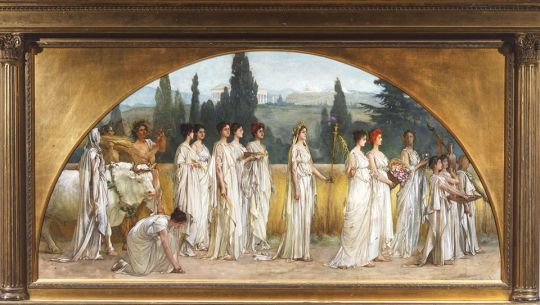
Now, as to the bit about Alexander and Hephaistion’s hypothetical children marrying…. Our ancient sources specifically say that Alexander married Hephaistion to Drypetis, the younger sister of his own bride Statiera,* so their children would be cousins. Those sources do not say he planned to marry any of those cousins to each other. Sure, cousin-marriage was fairly common among the upper classes. BUT.
A son, especially one intended to be heir, would need to make political marriages. The daughter of his father’s most loyal retainer does not count. Ha. (Something Kleopatra bemoans in DwtL: Rise, that Amyntor’s loyalty is not in question, so Philip would never in a million years give her to Hephaistion.)
Couldn’t a daughter of Hephaistion be an “extra” bride, as both Persia and Macedonia practiced royal polygamy? Perhaps. But the heir would need to make several of these political marriages, and to be “just another wife” could be awkward and potentially insulting to her honor (timē) and, thus, to Hephaistion’s. She might get Alexander’s second son, but he’s still the “spare,” so a third son is more likely.
Also, Hephaistion could need to marry off a daughter to create diplomatic ties for himself. His status would be extremely high (if not Alexander/King of Asia-high). So, his second (or third) daughter and a third son of Alexander would be the most likely pairing. (Assuming they each had that many kids.)
Why couldn’t Hephaistion’s son get a daughter of Alexander? Because daughters (and sisters) were alliance commodities.** Alexander would want to keep his unmarried. If Alexander had wanted a sentimentality betrothal, it would likely be a spare daughter of Hephaistion’s to a spare son of his.
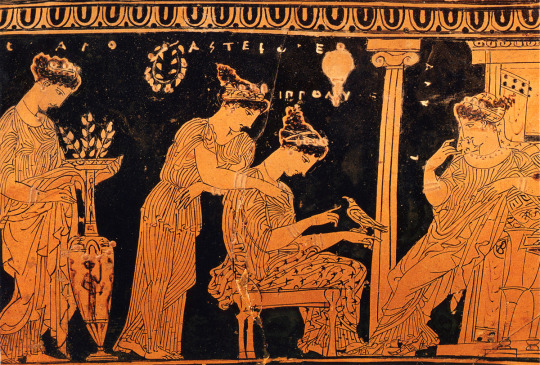
I’ve seen some folks comment that Alexander and Hephaistion married the two sisters as a marriage by proxy for themselves, the cousin-offspring as close as they could get to having children together.
This is (semi-)modern thinking. Unquestionably, Alexander’s affection for Hephaistion is the reason Hephaistion was given Drypetis. But the basic concept of two dear friends marrying sisters, or one marrying the sister of the other, in order to unite families is as old as the hills. It’s about creating blood-kinship. Throughout much of history, one’s strongest ties were not to a marriage partner, but to blood kin. Such ties were so important, in fact, one could be executed for the treasonous behavior of one’s (close) blood kin.*** This expectation of kinship debt still colors our legal system today in inheritance, and guardianship of offspring.
Alexander wasn’t creating a proxy-marriage to Hephaistion. He was literally making Hephaistion part of his family. You might be thinking…but isn’t that the same thing? No. Because marriages weren’t for love but (among the upper classes) for politics, and might be dissolved at some future point. Divorce was, if not common, also not uncommon. Girls were considered “loaners” from one family to another for the begetting of legitimate offspring. If her husband divorced her, she went home to Daddy. But any children of the match stayed with the father; they were his, not hers. Thus, becoming uncle to Hephaistion’s children would be a blood tie. Much more significant than a mere (proxy-)marriage tie.
——————-
*Just a reminder that Persian women seem to have taken regnal names, so Statiera’s daughter (Barsine) became Statiera at her marriage to Alexander. In fact, this is probably from where Macedonian royal wives adopted the practice.
**See the article by Beth Carney “The Sisters of Alexander the Great: Royal Relics” that I linked in a prior blog entry on Alexander’s siblings, as to why he never married them off once he was consistently winning/became King of Asia. He stood so far above others that his sisters effectively did, as well. In ancient thinking, men married the women of the conquered; they didn’t marry their own women to them. That’s why the Susa Weddings were all one-way: Macedonian Elite men to Persian noble/royal women. The ultimate power-move (and dick-move) was to marry their women but withhold your own in order to demonstrate who has power in any alliance. 😉
***As with Parmenion after the fall/execution of Philotas.
#asks#alexander the great#hephaistion#hephaestion#drypetis and statiera#alexander and hephaistion's children#royal marriage in the ancient eastern mediterranean#susa weddings#classics#ancient Greece#ancient macedonia#tagamemnon
14 notes
·
View notes
Text
FINAL PROJECT - CIVILIZATION
The Greek inspired ancient civilization of Brairinth
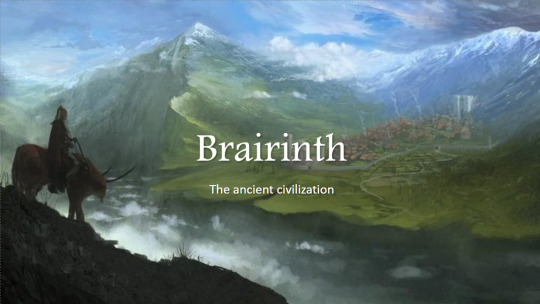
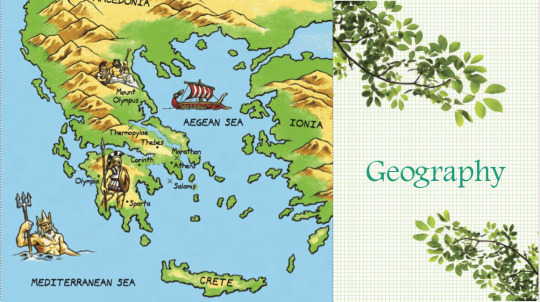
Ancient Greece – northern Greece, mountains surrounding & protecting
Macedonia
Mediterranean sea + Mount Olympus surrounding + route to Aegean sea

Weather is hot, during winter/spring (February-march) there is an extreme rainy season which allows for vegetation to flourish but also it is not completely detrimental as it only lasts like 2 months max. Regular rain other months would occur 2-3 times/month
All 4 seasons don’t really differ in temperature, but they are all there
The sea and rivers provide humidity for vegetation to thrive with natural irrigation

sheep, goats, pigs, chickens, and cows. They were used for meat, milk to make cheese, and fertilizer for crops. Sheep were valuable for their wool, which was used to make clothing.
Brairinth is able to thrive because of its trade and many exports from the mountain which the city-state is located, containing minerals like gold, bentonite, magnesite, perlite, and marble.
Its natural irrigation also allows for exports of rich crops such as apples, figs, pears, pomegranates, cucumbers, lettuce, garlic, and onions.
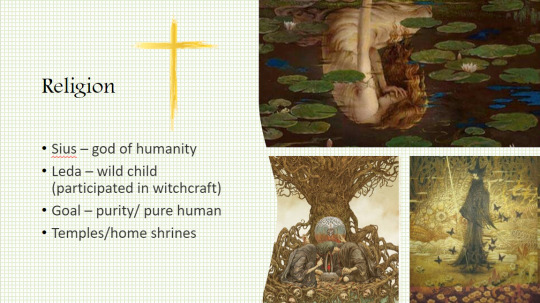
Brairithians have a separate religion from the rest of Ancient Greece, as they worship only one god: Sius.
worships Sius, a deity that upholds the values of viewing all living things as one, therefore treated with respect and understanding on all grounds. Sius was a god sent to earth, who in result created all living things on earth and treated them all as his children.
However, one of Sius’s children, Leda, was selfish and committed acts that refrained her from being human; such as refraining from giving birth and still taking pleasure in sex, and going as far as selling her soul (to Hades, god underworld) in exchange for feeling less emotions and experiencing things that made her superior to other humans such as magic.
For this Sius banished Leda from earth as she was an impure being and was not to live somewhere she could corrupt his other children. He took her to a forest where a tree consumed her and brought her into the underworld. This story carried on with Brairinth and corrupted their sense of justice, which caused them to dictate people’s lives over how pure and human they could be.
Brairithians dictate their day-to-day life with good conduct and pray once a day by leaving their chest and head visible to Sius, letting him see a person’s heart and mind properly. This is so that they may be cleansed of anything “un-human”, un-pure, or magical.
People believe that to successfully be sent to the afterlife unharmed, one must be buried with gifts representing that person’s life so that they do not lose their sense of self after death and their legacy goes with them (eg: craftsman is buried with their creations). Burials should take place immediately to “preserve” the body.
There is a temple high at the top of mount olympus which people must visit atleast once or twice per year to worship Sius genuinely, but many lower class citizens cannot afford to travel to the top of Brairinth to visit the temple so at home shrines are also an option.
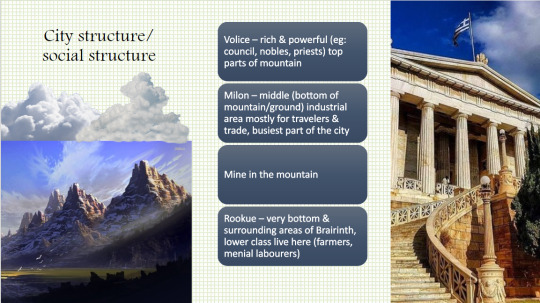
Brairinth is split into 3 sections: Volice, Milon, and Rookue.
Volice lies at the top parts of mount olympus, this is where all the astounding architecture is and where the more powerful and rich people of the city live. (eg: council, nobles, priests). They are involved in leisurely activities like art and buying goods such as carefully articulated clothing, silverware, and jewelry.
Milon is between Volice and Rookue, a middle ground. It is at the bottom of the mountains and outwards to the Aegean sea. This is both a residential area but also a very busy industrial area. Most citizens live here (merchants, craftsmen), but both people from Volice and Rookue travel here to trade and consume merchandise. Shops and businesses are run here, it is an ideal location for travellers who come to do business and trade. More successful shops are located higher up where the air is cleaner and there are better views as well as overall richer surroundings, while less successful shops are located closer to Rookue.
There is also a mine located in upper Milon in the mountains, allowing for mining jobs and exports of minerals like gold, bentonite, magnesite, perlite, and marble.
Rookue is the surrounding areas of the city-state, towards the sea and the natural borders of the mountain start to flatten. This is where the lower class lives (farmers, menial labourers). This area of Brairinth is very vulnerable to floods during the rainy season and would also be the first to be attacked during an invasion. There are not many advantages to living here and a few revolts have been started over the rights of lower class people in this area. This area is ideal for farming however, at least in the northern parts where there is more protection and natural irrigation because of the Mediterranean sea.
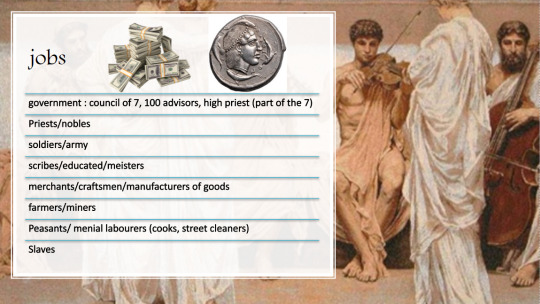
Usually jobs are passed down through class and it's pretty impossible to escape your destined role in society from birth, only people higher up in the hierarchy are able to get educated.
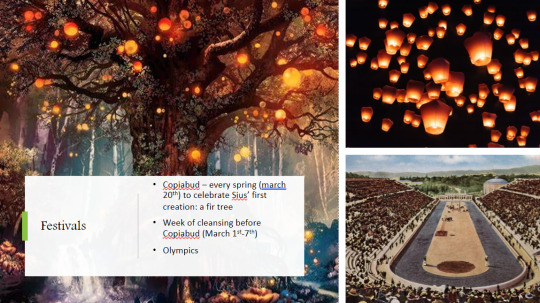
A holiday that takes place in Brairia is the Copiabud, a celebration that takes place every spring on March 20th. It is to celebrate the birth of the very first living creation of Sius, a fir tree. Kind of like Christmas, everyone has a little fir tree in their homes, plants a fir tree, or goes to the heart of the city-state where people gather around a large fir tree and light lanterns like in tangled.
There is also a week of cleansing shortly before the Copiabud to ensure that people are in the right state of mind to pray and celebrate Sius, this week takes place March 1st-7th and includes taking baths infused with oils, singing hymns, wearing sacred clothing, and on the final day not partaking in the consumption of goods/trade/purchasing.
Brairinth of course also takes part in the olympics every 4 years

Buildings and architecture are dependent on which part of the city is being observed.
Overall the same building strategies are used, columns/pillars are common (this is ancient Greece). Rectangular buildings are the most common, while cylinders are also used. Roofs are usually triangular, gable roofs. Higher status homes have 2 floors, sometimes 3. Homes were typically built around a courtyard, allowing space for leisure and to plant a fir tree. Wood and mud bricks were typically used in all homes, while marble was saved for the higher status homes in voice or buildings of importance. Vegetation is highly prioritised, vines and trees and gardens are kept in most homes and throughout cities.

Clothing in brairinth is adapted from other styles in ancient Greece, but the sacred colour is green because of close ties to nature in religion. Many richer people wear jewellery with a tree engraved into it to signify Sius, similar to how christians wear crosses. In fact, trees are symbols present all around Brairinth. It's typically pretty hot all year round so lighter fabric is used. It does get a bit colder in the mountain sometimes as well as windy, so shawls are used for those times.

Brairinth is a democracy built of 7 elected council members who make the laws of the city-state, and 100 government officials who help advise the council members and regulate the laws. The 7 are elected by citizens eligible to vote (old, land-owning dudes).
The 7 are elected based on different categories to ensure that all parts of the city are being listened to:
Meister: in charge of keeping records of history, being well versed in all different types of knowledge and advice well based on past dilemas. Requires very high education and many years in an academy with other scholars. Typically this role is taken by someone older and wiser.
General: in charge of leading the army of Brairinth but also has a place in the council to share matters of the army and fighting, making sure the army has the right materials and training
Architect: in charge of city-planning and advising on building matters and the needs of the citizens architecture-wise (temples, irrigation, public works).
scientist/mathematician/philosopher: knowledge in maths, science, philosophy, and astronomy, just like a meister it requires a lot of years in the academy.
messenger/ traveller/ spy: travels to surrounding areas to gain knowledge to bring back to the council. Kind of like a spy
Agriculture advisor: advises on farming needs and food regulation
Priest: the high priest of the main temple in Brairinth, advises on religious matters/needs
The 100 other government officials also listen and take in the needs of the citizens, citizens may come to the firm on Volice and present their problems for possible solutions (once again unfair to people in Rookue).
Criminals are prosecuted by guards and sent to the firm upon a group of judges and a priest (for Sius’s word on the matter) to decide their fate. Any major offences that are deemed a threat to the entirety of the city-state send the criminals straight to the council of 7 to decide.

Because of the complicated up/down mountain geography, transportation has been made faster with the introduction of pedals and pedaling powered transportation (bikes, really prototype ones). Horses have also become more common for people to ride around.
There is a giant conveyor belt-like system from Milon all the way to Volice made to transport goods (like a mail system), which is powered by pedaling. A new job at Milon requires some strong men to pedal for their lives as they send goods up to Milon. A few have tried to mail themselves to Volice but most failed. Imagine the calves on these guys.

The Hunglepicorina is a common instrument used. It is basically like an ocarina just with a few strings attached to the sides that play similarly to a harp.

Brairinth also introduced an organised prison system, by that I mean they kept criminals in dungeons inside the mountain higher in Volice in order to not intrude with mining. Cages were made to not face one-another so that criminals could not face each other and feel any sort of human connection. Criminals deemed of the highest offences, or threats, were publicly killed. Some criminals were publicly humiliated, made to walk the streets naked and sometimes stuffed in a barrel and rolled down the less steep parts of mount olympus, where everyone was invited to watch. There is not much crime in Brairinth because of fear of the harsh punishments.
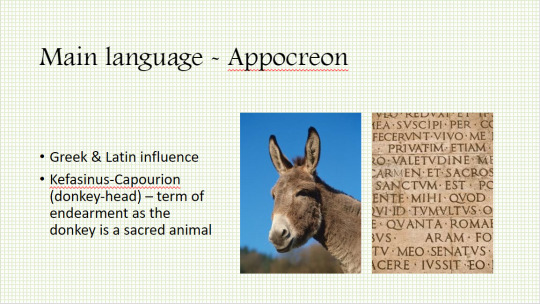
Writing is made through engraving or painting tablets of all sorts of materials. Main language used is Appocreon, similar to Greek and Latin.
A common word used for endearment in this language translates to “donkey-head” (Kefasinus-capourion). In Brairinth calling others donkey heads was a friendly way of saying hello, like “hey bud” or “hi dear friend”, as the donkey is a sacred animal (basically calling somebody wise). However, a war was once almost started over the exchange of this term with a higher up from another city as they mistook the light-hearted phrase for an insult (ass).
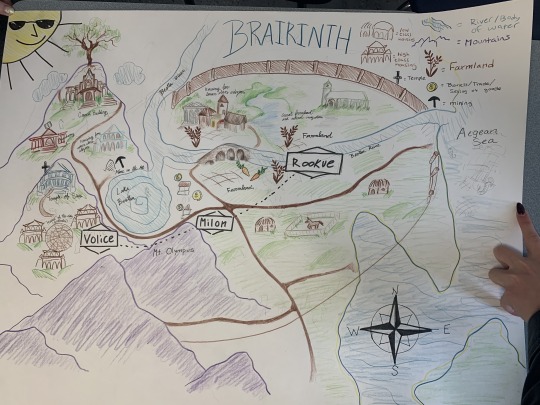

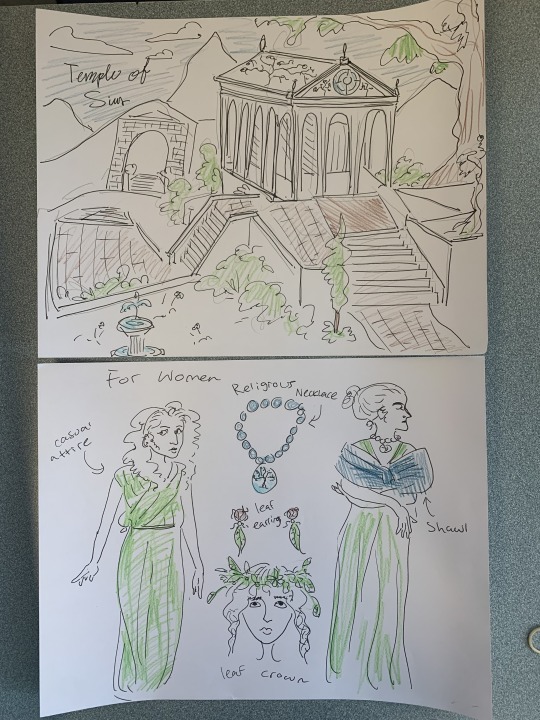
0 notes
Text
17 places to see in Thessaloniki, Greece for starters
Thessaloniki is a city loved like few others. It is the second largest city in Greece and it is often referred to as the Capital of the North, Cultural Capital or Co-Capital to Athens, out of the love Greeks have for it. It offers a mix of ancient and medieval history, a diverse past, romanticism, vibrant nightlife, relaxed lifestyle and delicious cuisine that few can resist. There are countless things to see and do in Thessaloniki but these are the first 17 you have to tick off your list.
1. The White Tower
The landmark of Thessaloniki was built in 1535 by the Ottomans and was used as a prison that was originally called Tower of Blood. Allegedly, it got its current name after a Jewish prisoner was freed and agreed to paint the tower white. The tower hosts a gallery and offers tremendous views to the city and the Thermaic Gulf from its top.
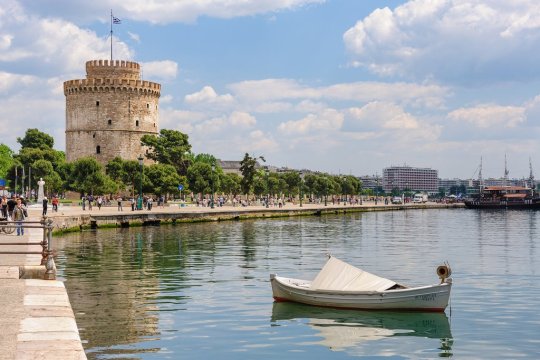
2. Aristotle Square
This is the most popular square in Thessaloniki, with beautiful and characteristic architecture like in Olympion movie theatre and Electra Palace as well as plenty of pretty cafes, bars and retail shops.

3. The harbour
The port of the city has the flair of everything old that has to adjust to the passage of time. Large industrial structures, strong artistic presence with the Museum of Cinematography and the Museum of Photography and the lively energy of the students who love to relax in this spot all together compose a special scene.
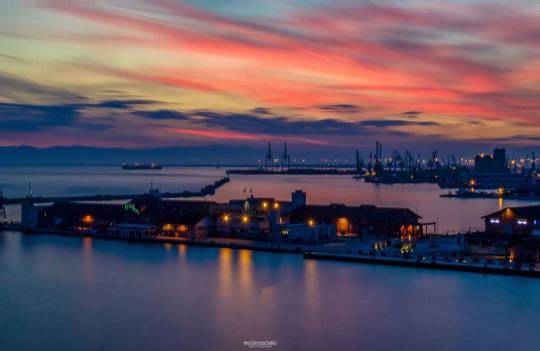
4. Alexander the Great statue
How could Alexander be far from his half-sister, Thessaloniki? Alexander’s statue in Thessaloniki is the largest in Greece and was sculpted in 1974 by Eu. Moustakas.
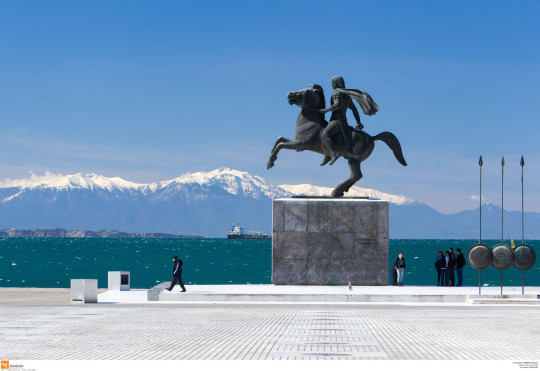
5. The Umbrellas
One of the most insta-popular spots of the city, the Umbrellas is a modern art composition by artist Giorgos Zoggolopoulos in 1995.
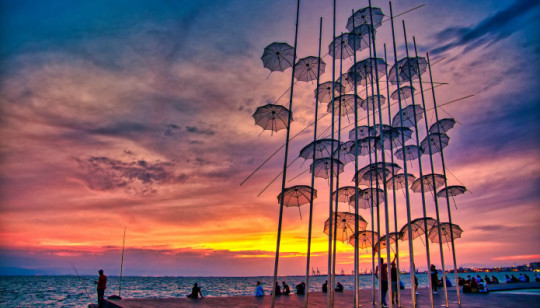
6. The New Waterfront
The New Waterfront is a wide and long walking and cycling park starting from Macedonia Palace Hotel and reaching the Concert Hall. It is popular with everybody, young and old, couples, athletes, cyclists, children and was recently created by architects Prodromos Nikephorides and Bernard Cuomo.

7. Nea Krini
Nea Krini, in the eastern suburbs of Thessaloniki, is a great place to unwind and try seafood and fish in the local restaurants. A stroll in the Aretsus Marina is a must too.
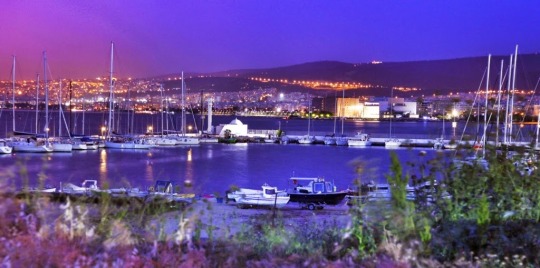
8. Saint Demetrius Church
This is an emblematic Palaeochristian church, with a very long history, where the relics of Saint Demetrius are kept. Demetrius is the patron saint of the city, because his nameday celebration is in 26 October and incidentally that was the day the city was liberated from the Ottoman Empire. Besides the saint’s remains, the church has crypts and catacombs beneath and is a UNESCO monument.
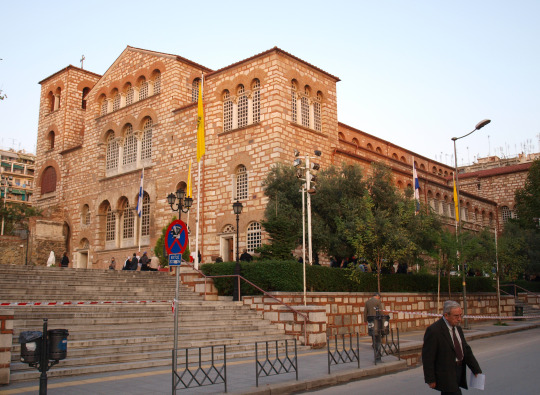
9. Saint Sophia Church
Another UNESCO monument, Saint Sophia church was built in the 8th century AD and is a prime example of Byzantine architecture.
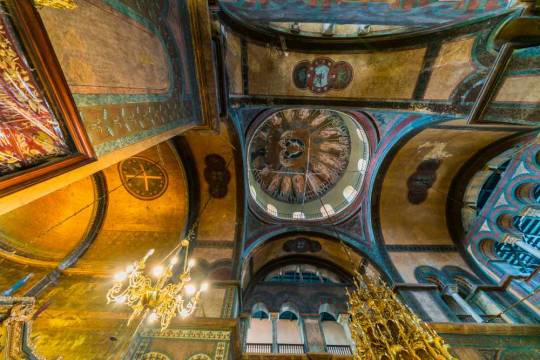
10. OTE Tower
Built in 1970, this 76 meter tall tower was originally OTE’s pavilion in the Thessaloniki’s International Fair. On its top there is a rotating roof cafe from which you can enjoy views to any angle of the city.
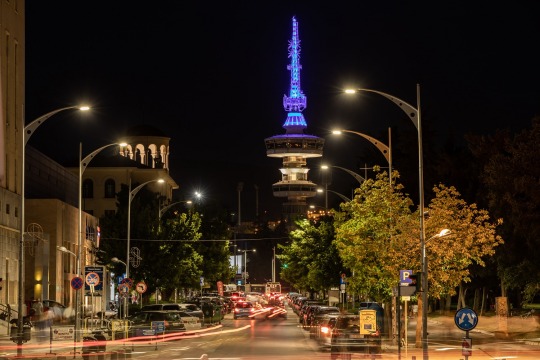
11. Turkish Baths
Thessaloniki's Turkish Baths might be the best preserved in Greece. They were built in 1444, often with materials taken from Christian churches and functioned as baths until 1968.
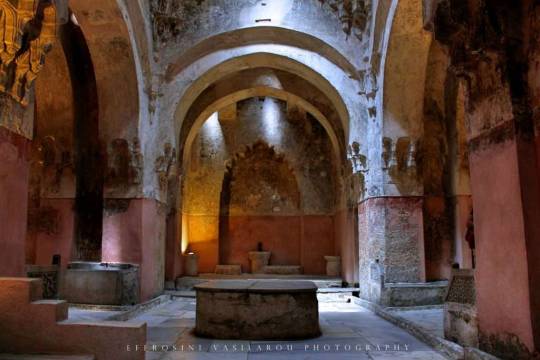
12. Arch of Galerius
Also known as “Kamara”, this is the most common meeting point in the city. Kamara is the surviving arch of the palace the Roman Emperor Galerius built in order to celebrate his victories against the Persians.
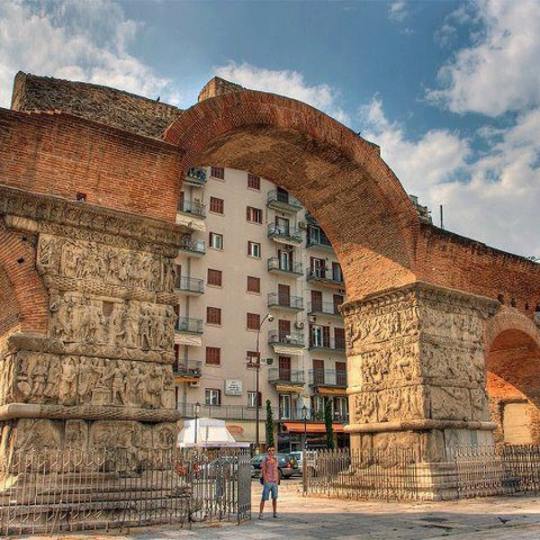
13. Upper Town
This is the elevated old town of Thessaloniki, surrounded by the fortresses. Upper Town is great for a visit in the evening and at night and it offers spectacular views to the city and sea plus many options in seafood and traditional coffee shops.
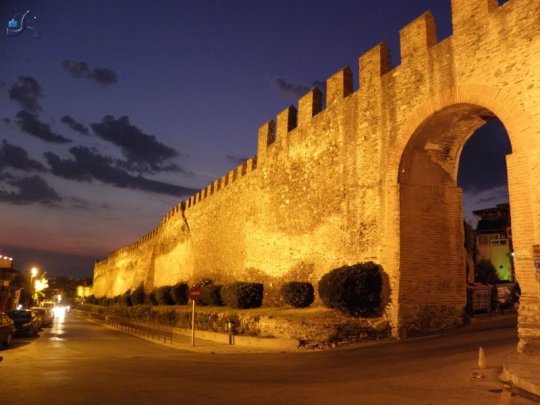
14. Rotunda
Rotunda was built in the 4th century AD by emperor Galerius and it was meant to be a Pantheon or a mausoleum. Galerius died early though and the building was turned into a christian church while in the 16th century the Ottomans turned it into a mosque. Rotunda suffered a lot from earthquakes but large parts of its original mosaics are rescued.
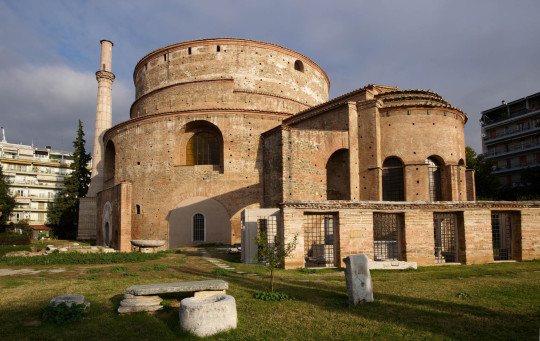
15. Ladadika
A district where oil was sold, and where prior to 1990 the sex workers would be found, earning such a reputation that songs were written about this, has nowadays become one of the hotspots of the city with vibrant restaurants, cafes, bars and hotels. Hence its vibrant lighthearted yet vaguely underground aesthetic.
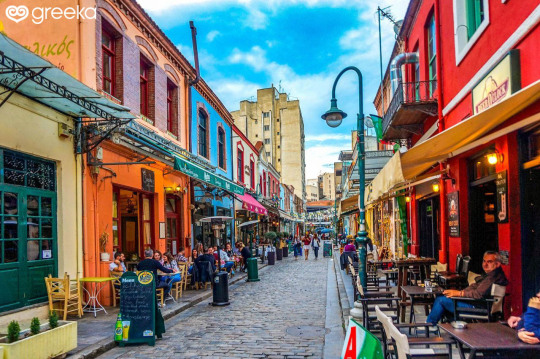
16. The Archaeological Museum of Thessaloniki
It is the largest archaeological museum in Northern Greece and one of the biggest in the country. Its exhibits are of huge significance and come mostly from Thessaloniki and the greater region of Macedonia. It covers prehistoric times until late antiquity.
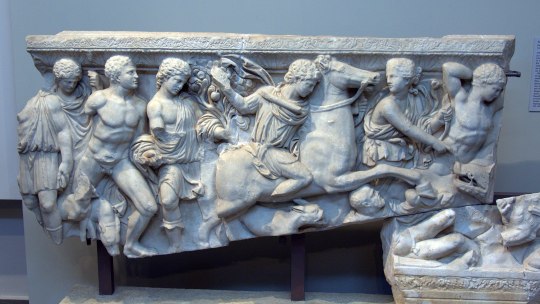
17. The Museum of Byzantine Culture of Thessaloniki
It is one of the most important Byzantine museums in Greece and it is also acclaimed for its design, a notable example of Modern Greek architecture. The museum covers all aspects of everyday life in the Byzantine Empire, the ecclesiastical art, the Byzantine Emperors and the life in the imperial palace as well as the Byzantine legacy in Modern Greece.
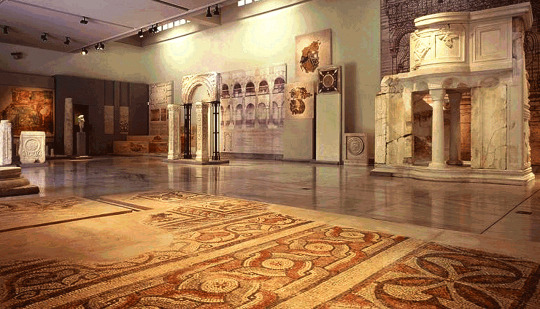
Original source in Greek (made some modifications with the recommendations)
#greece#europe#city#travel guide#tourist guide#travel#wanderlust#thessaloniki#macedonia#mainland#white tower#ote tower#ladadika#saint Sophia church#saint Demetrius church#rotunda#arch of galerius#Turkish baths#upper town of thessaloniki#Aristotle square#archaeological museum of thessaloniki#museum of byzantine culture
188 notes
·
View notes
Text
Holidays 1.13
Holidays
Accordion Day
All in the Family Day
Blame Someone Else Day
Change of Style Day
Children’s Day (Thailand)
Copper Day (French Republic)
Cuckoo Dancing Day
Day of Freedom Defenders (Lithuania)
Delta Sigma Theta Day
Democracy Day (Cape Verde)
Door-to-Door Salespeople Day
Eugenio Maria de Hostos’ Day (Puerto Rico)
Festival of the Body of Habits
Frisbee Day
J’Accuse Day
James Joyce Day
Kayin New Year (Myanmar)
Korean-American Day
Liberation Day (Togo)
Make Your Dreams Come True Day
Malanka (Belarus, Russia, Ukraine)
National AMBER Alert Awareness Day
National Aviation Day (Thailand)
National Dhaka Day (Nepal)
National Catherine Day
National French Bulldog Day
National Kathleen Day
National Shower Together Day
National Sticker Day
National Tip-Toe Day
Poetry Break Day
Public Radio Broadcasting Day
Radio Day
Redemption Day (Ghana)
Rubber Duckie Day
Russian Press Day (Russia)
Sidereal Winter Solstice Eve (SE Asia)
Silvesterklausen (Switzerland)
Stephen Foster Memorial Day
St. Knut’s Day (Finland)
Strive and Succeed Day
Swiftie Day
Trog Day
Turn On Your Radio Day
Universal Basic Income (UBI) Day
Uruka (Assam, India)
World Day to Combat Depression (WHO)
Yennayaer (Berbers)
Zero Birth Day
Food & Drink Celebrations
Go Out To Dinner Day
Peach Melba Day
2nd Saturday in January
Children’s Day (Thailand) [2nd Saturday]
Eagle Day [2nd Saturday]
Miss America Pageant [2nd Saturday]
National Skate Day for Alzheimer’s (Canada) [2nd Saturday]
National Vision Board Day [2nd Saturday]
Vinegrower's Day (Bulgaria)
Independence & Related Days
Constitution Day (Mongolia)
Theria (Declared; 2022) [unrecognized]
New Year’s Days
Calennig (Wales)
Old New Year’s Eve (Belarus, Macedonia, Montenegro, Republic of Srpska, Russia, Serbia, Ukraine)
Festivals Beginning January 13, 2024
Apalachicola Oyster Cook-Off (Apalachicola, Florida)
Asian American Expo (La Verne, California) [thru 1.14]
Blythe Bluegrass Jam Festival (Blythe, California) [thru 1.14]
Carnival of Vevčani (Macedonia) [thru 1.14]
Florida Keys Seafood Festival (Key West, Florida) [thru 1.14]
Mankato Craft Beer Expo (Mankato, Minnesota)
Morro Bay Winter Bird Festival (Morro Bay, California) [thru 1.16]
Quaker Oatmeal Festival (Lafayette, Colorado) [
Social in the City (London, UK) [thru 1.14]
Wintersköl Beer Festival (Aspen, Colorado)
Virginia Fly Fishing and Wine Festival (Roswell, Virginia) [thru 1.14]
Feast Days
Bhogi (Tamil; 1st Day of Pongol)
Blessed Veronica of Milan (Christian; Saint)
Compitalia Mania: Day of the Mother of Ghosts (Pagan)
The Druids (Positivist; Saint)
Elian (Christian; Saint)
Feast of St. Kentigern (a.k.a. St. Mungo; Scotland)
George Fox (Lutheran; Saint)
Hilary of Poitiers (a.k.a. Hilarius; Christian; Saint)
Ides of January (Ancient Rome)
Jan Van Goyen (Artology)
Kentigern (Christian; Saint)
Knut's Day or Tjugondag Knut, the last day of Christmas. (Finland, Sweden)
Lohri (India)
Maghi (Sikh)
Mawlid al-Nabi (Birthday of the prophet Mohammed, North American date; Muslim)
Midvintersblot (a.k.a. Mid Winter Blot or Midvetr, Midvetrarblot, Jordblot, Thorrablot, Freyrblot; Ancient Norse mid-winter feast)
Mungo (Christian; Saint)
Paul Gavarni (Artology)
Pongol begins (India)
Recuperation Fortnight begins (Shamanism)
Rubber Duckie (Muppetism)
Scalloway Fire Festival (Scotland)
Skeptics Day (Pastafarian)
Theogamia (Celebration of Zeus & Hera’s marriage; Ancient Greece)
Tiugunde Day (Old England)
Tjugondag (a.k.a. Tjugondagen Knut or the Last Day of Christmas or St. Knut's Day; Finland, Sweden)
Trumpeters Promenade the City in the Habits of Women (Ancient Rome)
Tyvendedagen (a.k.a. Twentieth Day of Knut; Norway)
Veronica (Christian; Saint)
Werner Van Braun (Church of the SubGenius; Saint)
Yvette (Christian; Blessed)
Lucky & Unlucky Days
Prime Number Day: 13 [6 of 72]
Tomobiki (友引 Japan) [Good luck all day, except at noon.]
Uncyclopedia Bad to Be Born Today (because it’s the13th day of the year, never a good thing and never will be for you.)
Unfortunate Day (Pagan) [4 of 57]
Premieres
The Big Sky, by A.B. Guthrie Jr. (Novel; 1947)
A Bit of Fry & Laurie (UK TV Series; 1989)
A Boy, a Gun and Birds (Color Rhapsody Cartoon; 1940)
All Together (SS Disney Cartoon; 1942)
The China Shop (Disney Cartoon; 1934)
Darling in the Franxx (Anime TV Series; 2018)
Davy Jones Locker, featuring Willie Whopper (Ub Iwerks Cartoon; 1934)
Donald’s Lucky Day (Disney Cartoon; 1939)
The Donkey Serenade, recorded by Allan Jones (Song; 1938)
Dr. Sax, by Jack Kerouac (Novel; 1959)
Duke Of Earl, by Gene Chandler (Song; 1962)
Flowers, by Miley Cyrus (Song; 2023)
At Folsom Prison, by Johnny Cash (Concert recorded; 1968)
Glory Road (Film; 2006)
Hanna-Barbera’s All-Star Comedy Ice Revue (Animated TV Special; 1978)
Hill-billing and Cooing (Fleischer/Famous Popeye Cartoon; 1956)
Hocus Pocus Pow Wow (WB LT Cartoon; 1968)
Hoodwinked! (Film; 2006)
Hook, Line and Stinker (Woody Woodpecker Cartoon; 1969)
The Iron Lady (Film; 2012)
Johnny Cash at Folsom Prison, recorded by Johnny Cash (Live Concert Album; 1968)
Kraven the Hunter (Film; 2023)
Last Exit to Brooklyn, by Hubert Selby Jr. (Novel; 1963)
Legends of the Fall (Film; 1995)
My Hero, Zero (Schoolhouse Rock Cartoon; 1973)
Night and Day, by Cole Porter (Song; 1932)
The Owl and the Pussycat featuring Sourpuss (Terrytoons Cartoon; 1939)
Peacemaker (TV Series; 2022)
Plexus, by Henry Miller (Novel; 1953) [Rosy Crucifixion #2]
Real Women Have Curves (Film; 2002)
Ruby Tuesday, by The Rolling Stones (Song; 1967)
The Sands of Mars, by Arthur C. Clarke (Novel; 1951)
The Screwy Truant, featuring Screwy Squirrel (Tex Avery MGM Cartoon; 1945)
A Series of Unfortunate Events (TV Series; 2017)
Schitt’s Creek (TV Series; 2015)
Shanghaied (Disney Cartoon; 1934)
Stitch & the Samurai (Manga; 2020)
Tangled Ever After (Disney Cartoon; 2012)
Terminator: The Sarah Connor Chronicles (TV Series; 2008)
The Times They Are a-Changin’, by Bob Dylan (Album; 1964)
Toxic, by Britney Spears (Song; 2004)
U Can’t Touch This, by MC Hammer (Song; 1990)
Wolf Like Me (TV Series; 2022)
Yellow Submarine, by The Beatles (Album; 1969)
Today’s Name Days
Hilarius, Hilmar, Jutta, Remigius (Austria)
Hilarije, Juta, Radovan, Veronika (Croatia)
Edita (Czech Republic)
Hilarius (Denmark)
Hillar, Hillo, Illar, Illart, Illo (Estonia)
Nuutti (Finland)
Hilaire, Yvette (France)
Hilarius, Hilmar, Jutta (Germany)
Emilos (Greece)
Veronika (Hungary)
Ilario, Leonzio (Italy)
Aira, Ārijs, Āris, Harijs (Latvia)
Dargaudas, Gilvydė, Iveta, Veronika (Lithuania)
Gislaug, Gisle (Norway)
Bogumił, Bogusąd, Bogusława, Godfryd, Gotfryd, Leoncjusz, Melania, Weronika (Poland)
Ermil (Romania)
Rastislav (Slovakia)
Hilario (Spain)
Knut (Sweden)
Ivette, Veronica, Vonnie, Vonny, Yvette, Yvonne (USA)
Today is Also…
Day of Year: Day 13 of 2024; 353 days remaining in the year
ISO: Day 6 of week 2 of 2024
Celtic Tree Calendar: Beth (Birch) [Day 19 of 28]
Chinese: Month 12 (Yi-Chou), Day 3 (Bing-Zi)
Chinese Year of the: Rabbit 4721 (until February 10, 2024)
Hebrew: 3 Shevat 5784
Islamic: 2 Rajab 1445
J Cal: 13 White; Sixday [13 of 30]
Julian: 31 December 2023
Moon: 7%: Waxing Crescent
Positivist: 13 Moses (1st Month) [The Druids]
Runic Half Month: Peorth (Womb, Dice Cup) [Day 4 of 15]
Season: Winter (Day 24 of 89)
Zodiac: Capricorn (Day 23 of 31)
0 notes
Text
Holidays 1.13
Holidays
Accordion Day
All in the Family Day
Blame Someone Else Day
Change of Style Day
Children’s Day (Thailand)
Copper Day (French Republic)
Cuckoo Dancing Day
Day of Freedom Defenders (Lithuania)
Delta Sigma Theta Day
Democracy Day (Cape Verde)
Door-to-Door Salespeople Day
Eugenio Maria de Hostos’ Day (Puerto Rico)
Festival of the Body of Habits
Frisbee Day
J’Accuse Day
James Joyce Day
Kayin New Year (Myanmar)
Korean-American Day
Liberation Day (Togo)
Make Your Dreams Come True Day
Malanka (Belarus, Russia, Ukraine)
National AMBER Alert Awareness Day
National Aviation Day (Thailand)
National Dhaka Day (Nepal)
National Catherine Day
National French Bulldog Day
National Kathleen Day
National Shower Together Day
National Sticker Day
National Tip-Toe Day
Poetry Break Day
Public Radio Broadcasting Day
Radio Day
Redemption Day (Ghana)
Rubber Duckie Day
Russian Press Day (Russia)
Sidereal Winter Solstice Eve (SE Asia)
Silvesterklausen (Switzerland)
Stephen Foster Memorial Day
St. Knut’s Day (Finland)
Strive and Succeed Day
Swiftie Day
Trog Day
Turn On Your Radio Day
Universal Basic Income (UBI) Day
Uruka (Assam, India)
World Day to Combat Depression (WHO)
Yennayaer (Berbers)
Zero Birth Day
Food & Drink Celebrations
Go Out To Dinner Day
Peach Melba Day
2nd Saturday in January
Children’s Day (Thailand) [2nd Saturday]
Eagle Day [2nd Saturday]
Miss America Pageant [2nd Saturday]
National Skate Day for Alzheimer’s (Canada) [2nd Saturday]
National Vision Board Day [2nd Saturday]
Vinegrower's Day (Bulgaria)
Independence & Related Days
Constitution Day (Mongolia)
Theria (Declared; 2022) [unrecognized]
New Year’s Days
Calennig (Wales)
Old New Year’s Eve (Belarus, Macedonia, Montenegro, Republic of Srpska, Russia, Serbia, Ukraine)
Festivals Beginning January 13, 2024
Apalachicola Oyster Cook-Off (Apalachicola, Florida)
Asian American Expo (La Verne, California) [thru 1.14]
Blythe Bluegrass Jam Festival (Blythe, California) [thru 1.14]
Carnival of Vevčani (Macedonia) [thru 1.14]
Florida Keys Seafood Festival (Key West, Florida) [thru 1.14]
Mankato Craft Beer Expo (Mankato, Minnesota)
Morro Bay Winter Bird Festival (Morro Bay, California) [thru 1.16]
Quaker Oatmeal Festival (Lafayette, Colorado) [
Social in the City (London, UK) [thru 1.14]
Wintersköl Beer Festival (Aspen, Colorado)
Virginia Fly Fishing and Wine Festival (Roswell, Virginia) [thru 1.14]
Feast Days
Bhogi (Tamil; 1st Day of Pongol)
Blessed Veronica of Milan (Christian; Saint)
Compitalia Mania: Day of the Mother of Ghosts (Pagan)
The Druids (Positivist; Saint)
Elian (Christian; Saint)
Feast of St. Kentigern (a.k.a. St. Mungo; Scotland)
George Fox (Lutheran; Saint)
Hilary of Poitiers (a.k.a. Hilarius; Christian; Saint)
Ides of January (Ancient Rome)
Jan Van Goyen (Artology)
Kentigern (Christian; Saint)
Knut's Day or Tjugondag Knut, the last day of Christmas. (Finland, Sweden)
Lohri (India)
Maghi (Sikh)
Mawlid al-Nabi (Birthday of the prophet Mohammed, North American date; Muslim)
Midvintersblot (a.k.a. Mid Winter Blot or Midvetr, Midvetrarblot, Jordblot, Thorrablot, Freyrblot; Ancient Norse mid-winter feast)
Mungo (Christian; Saint)
Paul Gavarni (Artology)
Pongol begins (India)
Recuperation Fortnight begins (Shamanism)
Rubber Duckie (Muppetism)
Scalloway Fire Festival (Scotland)
Skeptics Day (Pastafarian)
Theogamia (Celebration of Zeus & Hera’s marriage; Ancient Greece)
Tiugunde Day (Old England)
Tjugondag (a.k.a. Tjugondagen Knut or the Last Day of Christmas or St. Knut's Day; Finland, Sweden)
Trumpeters Promenade the City in the Habits of Women (Ancient Rome)
Tyvendedagen (a.k.a. Twentieth Day of Knut; Norway)
Veronica (Christian; Saint)
Werner Van Braun (Church of the SubGenius; Saint)
Yvette (Christian; Blessed)
Lucky & Unlucky Days
Prime Number Day: 13 [6 of 72]
Tomobiki (友引 Japan) [Good luck all day, except at noon.]
Uncyclopedia Bad to Be Born Today (because it’s the13th day of the year, never a good thing and never will be for you.)
Unfortunate Day (Pagan) [4 of 57]
Premieres
The Big Sky, by A.B. Guthrie Jr. (Novel; 1947)
A Bit of Fry & Laurie (UK TV Series; 1989)
A Boy, a Gun and Birds (Color Rhapsody Cartoon; 1940)
All Together (SS Disney Cartoon; 1942)
The China Shop (Disney Cartoon; 1934)
Darling in the Franxx (Anime TV Series; 2018)
Davy Jones Locker, featuring Willie Whopper (Ub Iwerks Cartoon; 1934)
Donald’s Lucky Day (Disney Cartoon; 1939)
The Donkey Serenade, recorded by Allan Jones (Song; 1938)
Dr. Sax, by Jack Kerouac (Novel; 1959)
Duke Of Earl, by Gene Chandler (Song; 1962)
Flowers, by Miley Cyrus (Song; 2023)
At Folsom Prison, by Johnny Cash (Concert recorded; 1968)
Glory Road (Film; 2006)
Hanna-Barbera’s All-Star Comedy Ice Revue (Animated TV Special; 1978)
Hill-billing and Cooing (Fleischer/Famous Popeye Cartoon; 1956)
Hocus Pocus Pow Wow (WB LT Cartoon; 1968)
Hoodwinked! (Film; 2006)
Hook, Line and Stinker (Woody Woodpecker Cartoon; 1969)
The Iron Lady (Film; 2012)
Johnny Cash at Folsom Prison, recorded by Johnny Cash (Live Concert Album; 1968)
Kraven the Hunter (Film; 2023)
Last Exit to Brooklyn, by Hubert Selby Jr. (Novel; 1963)
Legends of the Fall (Film; 1995)
My Hero, Zero (Schoolhouse Rock Cartoon; 1973)
Night and Day, by Cole Porter (Song; 1932)
The Owl and the Pussycat featuring Sourpuss (Terrytoons Cartoon; 1939)
Peacemaker (TV Series; 2022)
Plexus, by Henry Miller (Novel; 1953) [Rosy Crucifixion #2]
Real Women Have Curves (Film; 2002)
Ruby Tuesday, by The Rolling Stones (Song; 1967)
The Sands of Mars, by Arthur C. Clarke (Novel; 1951)
The Screwy Truant, featuring Screwy Squirrel (Tex Avery MGM Cartoon; 1945)
A Series of Unfortunate Events (TV Series; 2017)
Schitt’s Creek (TV Series; 2015)
Shanghaied (Disney Cartoon; 1934)
Stitch & the Samurai (Manga; 2020)
Tangled Ever After (Disney Cartoon; 2012)
Terminator: The Sarah Connor Chronicles (TV Series; 2008)
The Times They Are a-Changin’, by Bob Dylan (Album; 1964)
Toxic, by Britney Spears (Song; 2004)
U Can’t Touch This, by MC Hammer (Song; 1990)
Wolf Like Me (TV Series; 2022)
Yellow Submarine, by The Beatles (Album; 1969)
Today’s Name Days
Hilarius, Hilmar, Jutta, Remigius (Austria)
Hilarije, Juta, Radovan, Veronika (Croatia)
Edita (Czech Republic)
Hilarius (Denmark)
Hillar, Hillo, Illar, Illart, Illo (Estonia)
Nuutti (Finland)
Hilaire, Yvette (France)
Hilarius, Hilmar, Jutta (Germany)
Emilos (Greece)
Veronika (Hungary)
Ilario, Leonzio (Italy)
Aira, Ārijs, Āris, Harijs (Latvia)
Dargaudas, Gilvydė, Iveta, Veronika (Lithuania)
Gislaug, Gisle (Norway)
Bogumił, Bogusąd, Bogusława, Godfryd, Gotfryd, Leoncjusz, Melania, Weronika (Poland)
Ermil (Romania)
Rastislav (Slovakia)
Hilario (Spain)
Knut (Sweden)
Ivette, Veronica, Vonnie, Vonny, Yvette, Yvonne (USA)
Today is Also…
Day of Year: Day 13 of 2024; 353 days remaining in the year
ISO: Day 6 of week 2 of 2024
Celtic Tree Calendar: Beth (Birch) [Day 19 of 28]
Chinese: Month 12 (Yi-Chou), Day 3 (Bing-Zi)
Chinese Year of the: Rabbit 4721 (until February 10, 2024)
Hebrew: 3 Shevat 5784
Islamic: 2 Rajab 1445
J Cal: 13 White; Sixday [13 of 30]
Julian: 31 December 2023
Moon: 7%: Waxing Crescent
Positivist: 13 Moses (1st Month) [The Druids]
Runic Half Month: Peorth (Womb, Dice Cup) [Day 4 of 15]
Season: Winter (Day 24 of 89)
Zodiac: Capricorn (Day 23 of 31)
0 notes
Text
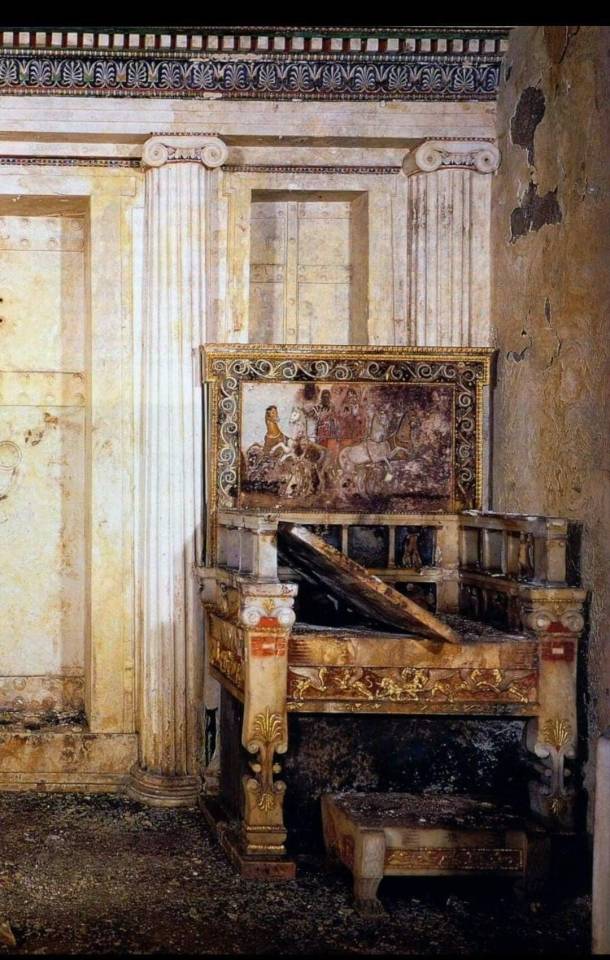
The unique marble throne of Eurydice (Grandmother of Great Alexander) as it was found inside the double-chambered Macedonian Tomb of Aigai (Vergina) in Macedonia, Greece, 340 BC.
Its back depicts Pluto and Persephone, while a number of embossed and gilded flowers and animals, as well as statuettes of 'korai' adorn almost all its visible parts.
Eurydice (Greek: 'Εὐρυδίκη', derived from the words 'ευρύς' - wide and 'δίκη' - right, custom, usage, law; justice, literally means: "wide justice") was an ancient Macedonian queen, wife of king Amyntas III of Macedon. She was the daughter of Sirras of Lyncestis, Upper Macedonia. Eurydice had four children: Alexander II, Perdiccas III, Philip II, all of whom would be crowned kings, a daughter Eurynoe, and through her son Philip, she was the paternal grandmother of Alexander the Great. Literary, inscriptional and archaeological evidence indicates that she played an important public role in Macedonian life and acted aggressively in the political arena.
163 notes
·
View notes
Text
I was going to make a post about Revenants, but, you know what, this is just going to be a post about the number of BS ways one can become a Revenant and/or vampire (as the folklore isn’t always clear) in Slavic and Balkan folklore. I’ve only included ones where I’m aware of how they’re created. There are a lot of revenant/vampiric creatures in this part of the world than are listed here.
Please note, in some areas of a country, the various terms are interchangeable, but are very different entities in other areas of the same country. You will also see a lot of similar words - this is due to language similarities. Also, the idea of 2 souls appears a lot - folk who have this are also said to have 2 hearts
Also, Hungary is not considered a Slavic country and will not be included.
Long post, so line break:
Albania:
Note: while not excusable, this was an area where a lot of damage was done during the Ottoman conquests and was part of the Ottoman empire until 1912. Please keep that in mind
Liogat/Liougat/Ljugat : created upon the death of all Albanians of Turkish descent. Does not matter how they lived their lives
Sampiro: created upon the death of all Albanians of Turkish descent. Can also be created by Albanians who committed an “unnatural act” in life. Examples are, bestiality, homosexuality, prostitution, transvestism, heterosexuality with a Turkish person, consuming meat handled by a Turk, being a habitual liar, or being a professional thief
Shtriga: a vampiric witch and not actually dead. Created from a woman who has become evil through envy or never marrying.
Vryolakas: created when an animal like a cat or dog jumps over the body before burial, person dies by murder or suicide, a person eats meat from an animal killed by a werewolf, or was an evil magic user
Belarus:
Mjertovjec: created when a witch or werewolf died. Uniquely similar to the Filipino Manananggal
Bosnia:
Blut Aussauger (originally from Bosnia, but brought into German lore.. and the German term is what’s used): created from either tricking/force feeding people to eat its burial dirt, eating meat from an animal a wolf killed, committing suicide, dies unbaptized, dies a witch, leads an immoral life, or if a nun walks over the grave (wtf?)
Bulgaria:
Note: It’s very common for these creatures to take 40 days to form after death in Bulgarian lore.
Krvoijac - created from a person who drinks wine or smokes during Lent.
Obour/Obur: traditions varied. Sometimes this ran in families. Sometimes it was created from someone who died suddenly, specifically of murder. Depending on region, this term can refer to 8 distinctly different creatures.
Opyrb/Opirb: created from folk who had improper burial rites, had a cat or dog jump over the dead body, a shadow fell on it before burial (I have no idea how this is prevented), a violent death, or sometimes evil people.
Ustrel/Istral: created from a child born on Saturday but died before being baptized.
Croatia:
Kosci: created from the death of a drowning victim, adulterer, or murderer
Kozlak: created from a child who was weaned before its time and died
Pijavica: created from a man who committed incest with his mother, or a particularly evil person
Vrukolak: (from Dalmatian region) - created when the victim of a Vrukolak dies, by being murdered without anyone witnessing the crime, or when a cat or dog jumps over an unburied corpse
Former Yugoslavia (Czech Republic and Slovakia)
Muroi - created from an evil person. Also similar to a Banshee - rings bells and calls the names of folk, who end up dying.
Nelapsi - specific to the Zemplin district. Created from someone with 2 souls
Upir - created from someone with 2 souls. Some areas state they were a witch in life.
Greece - included simply due to how old the legend is. Reported in ancient Greece.
Vrykolakas: traditionally revenants. Created by improper burial rites, something was left unfulfilled, they were cursed, or were seeking revenge against things something done to them or their families.
Macedonia:
Note: while not excusable, this was an area where a lot of damage was done during the Ottoman conquests and was part of the Ottoman empire until 1912. Please keep that in mind.
Ariogourouno: created from wicked Turkish people who never ate pork
Vryolakas: created when an animal like a cat or dog jumps over a corpse before burial, when a person dies by murder or suicide, if a person eats meat that came from an animal that was killed by a werewolf, or when an evil person who used magic dies
Poland:
As a note: areas Poland have a history of looking for signs upon birth to mark folk as something similar to a wise man or shaman. Over years, these signs influenced some of these legends.
Mwere: specifically of Kashubian lore of north central Poland – created from the death of an unbaptized children. Girls are more likely to become one
Ohyn: made from children born with a caul and teeth and died shortly after birth
Strzyga/Striga/Strzygoń - person born with 2 lines of teeth and/or 2 souls becomes one upon death
Upiór - a person born with 2 lines of teeth and/or 2 souls or someone who had a defining feature marking them as ‘off’ becomes one upon death. Or, folk cursed before death, dying suddenly, dying in childbirth, or having a grave desecrated could also create one. Also, in some areas, it’s specifically stated they’re made when a male child who was born with teeth dies.
Examples of what was ‘off”: being born with a caul, being a red head, being left handed, having a strange mark on the body, etc.
Vjesci: created from a person born with a caul or teeth renounces God on his or her last breath.
Wieszczy – made when a child born with a cleft palate and either a caul or teeth dies. As a side note: this creature is similar to a Banshee
Wili – created when a bride dies on her wedding day
Romania:
Note: there are a lot of regional variations of the word Strigoi. Also, the term Moroi sometimes appears, but the descriptions of it are so varied its hard to place exactly what this term references.
Moloi - created when an illegitimate child is killed by one of its parents
Muroni - created when a person dies a violent death, was a magic user in life, was a child born out of wedlock to parents born out of wedlock in life, or died from a Muroni attack
Pricolic: can be created from a child dies before being baptized, or person burns a porridge spoon, or sweeps dust from the home out of a doorway and into the setting sun (that is insanely specific). BTW, this is the undead variety. The wolf variety… is born of an incestuous relationship and has a tail
Strigoi - there are both living and dead variations of this entity. Living Strigoi are sometimes considered witches or sorcerers, but the 2 soul tradition also comes up. If there is a 2nd soul, it slips out at night and causes havoc. Dead Strigoi (strigoi mort) bring misfortune, illness, and death to their families.
Examples of how one can be created: suicide, cursed by a witch, born with extra nipple or tail, have a life full of sin, never married, be born as the seventh son of the seventh son or seventh daughter of the seventh daughter ((this can also make werewolves)), child born out of marriage, born too early, died before baptized, having red hair and blue eyes, being born with a caul...
Strigol: created when a magic user dies
Strigoiul Muronul: created when child born out of wedlock to parents born out of wedlock dies. Always a redheaded boy
Varacolaci: can run in families. Can also be created from an unbaptized child who dies, or a person who commits suicide.
Russia:
Eretik: created from the death of a human sorcerer
Inovercy: created upon the death of a person not practicing Russian Orthodox
Kudlac/Kudlak: created upon the death of person born with a red or dark colored caul.
Upierci: created from someone who committed suicide, died violently, or practiced witchcraft
Upierczi: created when a witch or heretic dies
Upyr: created upon the death of a heretic, sorcerer, witch, or a child born of the union of a werewolf and a witch
Viesczy: created when a person born with a caul or teeth or is the child of a witch and werewolf dies
Serbia:
Jedogonja: created from a person killed by a Jedogonja or the disease it can spread
Mullo/Muli: (Specifically from Roma who live in Serbia): created when a person dies suddenly of an unnatural cause or did not have proper funeral rites.
Nekrstenici : created from the death of an unbaptized child
Vlkodlak: created by when a man under 20 who was a murder, perjurer, or had improper relations with his mother dies, or if he was killed by a werewolf, or if he ate meat from an animal slain by a werewolf before death
Vukodlak : created when a heretic, magic user, or werewolf dies. Can also be created from someone who commits suicide or was murdered.
Slovenia - did not find any distinctly unique to Slovenia that are stated to be created from people
Ukraine - did not find any distinctly unique to the Ukraine that are stated to be created from people
Creatures found in lore of multiple countries:
Lampir/Lampiger/Lampijer/Lepir (Bosnia/Montenegro/Serbia): created from the first person who dies from an epidemic or plague
Navi (Bulgaria/Poland/Russia/Slovenia): created from the death of an unbaptized child or a drowning victim
Veshtitza (Montenegro/Serbia): created from a woman who practiced magic in life
Vompir/Vompiras (Macedonia/Bulgaria): created when a person is improperly mourned or buried, dies in disgrace, or passes on in ‘an unnatural way’ such as childbirth or suicide.
Vudkolak (southern Slavic countries): created when a werewolf dies, or if a bird flies over an unburied corpse
Creature of unclear Slavic lore
Kruvnik: created when a person was not properly mourned or does not have proper burial rites, committed suicide or was evil. Sometimes this is a person with 2 souls. Very neat side note with this one. They sometimes return to their wives. If the wife accepts him for 3 years, he will become human again.
Sources:
The Vampire Book: the encyclopedia of the Undead (3rd edition): by J. Gordon Melton
Night Creatures. The Enchanted World. Time-Life Books
Encyclopedia of Vampire Mythology by Theresa Bane (the full book can be found for free online)
#I spent way too much time working on this#folklore#revenants#vampiric revenants#Slavic folklore#I have many questions regarding some of these#Danny Phantom#dp
30 notes
·
View notes
Text
instagram
Gaia. Mother Earth. In the beginning, before anything existed, there was Chaos; the void. Gaia, the Earth, emerged from Chaos and formed the sea (Pontus) and the sky (Uranus) from her own body. Thus begins an ancient Greek creation saga. It is the point from which virtually ever general Greek mythology book begins. Gaia and Uranus become lovers and generate more beings (the Titans and Cyclopes, for instance). Following their separation, Gaia begat more children with Pontus. Gaia is literally the Earth: you can stand on her, but she is an active goddess with a personality, too. She is not a goddess of agriculture (that's Demeter.) Instead she is the spirit of the wild, sacred Earth containing untold treasure and potential. Gaia is devoted to all her children, accepting them as they are, unlike the many fathers (Uranus, Kronos, Zeus of Greek mythology who prey upon their heirs and seek to suppress them. Gaia battles with gods on behalf of her children. This mythic Gaia is based on the cosmologies of Greece and southern Italy, regions highly prone to earthquakes, where Earth is experienced as an active, living presence. She is not static or motionless but very much alive. Earth quakes may be perceived as expressions of divine anger, but they also physically resemble birthing contractions.
Gaia is an ever-present spirit of justice. She is never absent. Greek citizens swore public oaths to her. Shrines were dedicated to her; they were built near deep chasms, believed to be the most accessible place to communicate with her. Her shrines were associated with oracles such as those at Delphi, Athens, and Aegae (Macedonia). Delphi was the most famous oracle of the ancient world: Gaia's priestesses, known as pythonesses, prophesied after inhaling vapors emerging from a fissure in Gaia. Essentially, they spoke directly with her. The oracular spirit Apollo staged a coup, slaying the shrine's sacred serpent and installing himself as deity in charge. However, even after Delphi was rededicated to Apollo, the pythoness began her formal address to the deities with the words, "First in my prayer before all other deities, I call On Earth, primeval prophetess."
She is the ancestral mother of all life: the primal Mother Earth goddess. She is the mother of Uranus (the sky), from whose union she bore the Titans (themselves parents of many of the Olympian gods) and the Giants, and of Pontus (the sea), from whose union she bore the primordial sea gods.
Uranus wasn't thrilled about the offspring that he and Gaia had produced, so he forced them back inside her. As one might expect, she was less than pleased about this, so she persuaded Cronos to castrate his father. Later, she predicted that Cronos would be overthrown by one of his own children. As a precaution, Cronos devoured all of his own offspring, but his wife Rhea hid the infant Zeus from him. Later, Zeus dethroned his father and became the leader of the gods of Olympus.
The concept of an earth mother is not exclusive to Greek myth. In Roman legend, she is personified as Terra. The Sumerians honored Tiamet, and the Maori people honored Papatuanuku, the Earth Mother. Today, many NeoPagans honor Gaia as the earth, or as the archetypical embodiment of the Earth's power and energy.
8 notes
·
View notes